#data flow elements
Explore tagged Tumblr posts
Text
There's this picture of a TNG poker game with the question "whose genius idea was it to let the empath play?"
And I was like empath? What about the literal poker bot?
He has perfect memory and recall. He can see all your tells at a microscopic level. He knows all of your betting patterns. He can predict with almost 100% accuracy what cards you have, or what your draw is. He knows everything about every player at the game. He has unlimited knowledge and recall of every second he has spent with these players, and he knows elements of their personality from conversations outside of the game. He has as close to complete knowledge as one can get, in a game where success is dependent on exploiting incomplete information.
So when Data does not win a hand, or sweep a table, it's because he is *choosing* that outcome. Which raises the question: is he going easy on his friends, carefully directing the flow of the game to maximize their enjoyment? Or is he toying with them like a cat?
We may never know. I fold.
1K notes
·
View notes
Text

──── THE FILE of AMERICAN BEAUTY!
this fic contains content that may be hard to process, and / or disturbing to readers. for this reason, this cheat sheet has been created for quick reference for easier perusing, and to give voice and depth to all effected by those created in project nocturnis.
below includes what is known of project nocturnis & the notable subjects of its studies. to access the classified files regarding project nocturnis, click here.

WHAT IS PROJECT NOCTURNIS?──────────
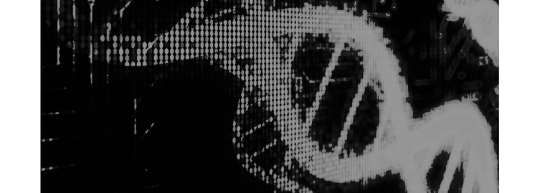
STARTING HYPOTHESIS IS THERE A WAY TO CONTROL THE POWERS GRANTED BY COMPOUND V?
summary an experiment that began in the year 1999, in a research facility deep in the nevada deserts. the government's best scientists paired up with the successors of dr. frederick vought to test theories in regard to this proposed hypothesis
variables infants with compound v serum (control group) compound v serum (independent variable, altered to test theories created by the starting hypothesis) infants with altered compound v serum (dependent variable, the affected element whose data is measured and studied in response to the independent variable)
trials seraphs, lycans, serpentes, chiropteras, felidaes, carcharias
every other detail known to the public about project nocturnis is [RESTRICTED] unless otherwise authorized by officials involved

WHO WAS IN PROJECT NOCTURNIS?──────────
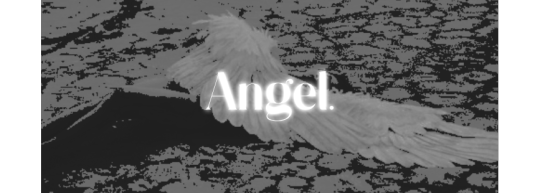
⋆ 。 ゚ ☁︎ 。 ⋆ 。 ゚ ☾ ゚ 。 ⋆ . . . CALLED ANGEL / PRONOUNS SHE / HER / MOST KNOWN AS AVI-000
file created during the nocturnis: seraph trials / the only remaining subject from the nocturnis: seraph trials / described by doctors as a medical miracle & scientists as a phenomenon / blood type o-negative / characterized by the large white-feathered wings protruding from her shoulder blades / theorized to potentially have abilities relating to the sun or fire, untested & unexplored / all tests ran on angel were humane in nature and for the greater good of the medical field's advancements


⋆ 。 ゚ ☁︎ 。 ⋆ 。 ゚ ☾ ゚ 。 ⋆ . . . CALLED WOLFE / PRONOUNS HE / HIM / MOST KNOWN AS LYC-083
file created during the nocturnis: lycan trials / subject eighty-three from the nocturnis: lycan trials / does not play well with others / blood type o-negative / characterized by the sharp elongated canines in his mouth, and the wolfish bone structure of his facial features / once theorized to potentially have abilities relating to the moon or darkness, proven otherwise by lack of developed abilities beyond canine-like appearance / all tests ran on wolfe were humane in nature and for the greater good of the medical field's advancements

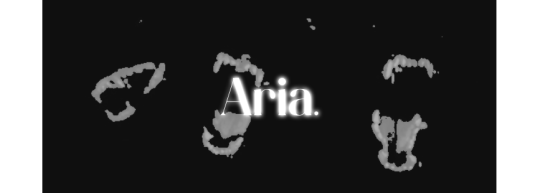
⋆ 。 ゚ ☁︎ 。 ⋆ 。 ゚ ☾ ゚ 。 ⋆ . . . CALLED ARIA / PRONOUNS THEY / THEM / MOST KNOWN AS FEL-004
file created during the nocturnis: felidaes trials / subject four from the nocturnis: felidaes trials / among the first of the many felidaes trials / blood type ab negative / characterized by the sharp elongated canines in their mouth, and imposing, intimidating stature / once theorized to potentially have abilities relating to telepathy, proven correct / all tests ran on aria were humane in nature and for the greater good of the medical field's advancements

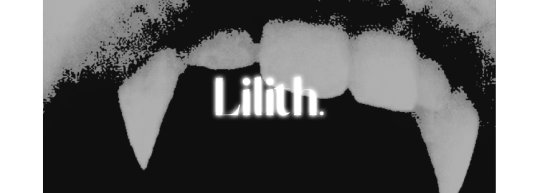
⋆ 。 ゚ ☁︎ 。 ⋆ 。 ゚ ☾ ゚ 。 ⋆ . . . CALLED LILITH / PRONOUNS SHE / HER / MOST KNOWN AS CHI-099
file created during the nocturnis: chiropteras trials / subject ninety-nine from the nocturnis: chiropteras trials / final surviving subject of the chiropteras trials / blood type unknown, no registered heartbeat or blood flow / characterized by her pale eyes and imposing glares, and the leathery black wings protruding from her shoulder blades / once theorized to potentially have abilities relating to blood, proven correct / all tests ran on lilith were humane in nature and for the greater good of the medical field's advancements

all subjects were raised under the watchful eye of genevieve scott, the director of project nocturnis and of its affiliation with vought international. under scott's command, all other information about their research in the nevada facilities & the subjects to emerge from it is classified.
update in 2023 single subject has escaped the nocturnis facilities. if spotted, please report to the federal bureau of investigation immediately. subject is unpredictable, with unknown abilities caused by altered compound v serum in her genetic code. subject can be identified by the white feathered wings on her back. proceed & approach with caution.

notes this isn't even all of the lore i have made up for this fic btw. i have put so much energy into developing all of this i hope it shows! these are the notable characters that will exist in the world alongside the boys' canons, with angel being the central focus.
tags @pieandflannel @pearlsvie @viluren @h8aaz @yulianie @angelicjackles @beausling @love2liz @lanasgirlfr @bejeweledinterludes @veyveyx @tinas111 @briisbananass @cowboysandcigarettes @spiritkissin @deanswidow @aurevina @bruisedfig @soldiersgirl @jensenacklesballsack @honeyroots @blossomingorchids @idk6505 @funkycoloured @mahi-wayy @k-slla @fairychris @bluemerakis @lilyyyjcb @theosaurous @maeji-may @rositaslabyrinth @v1v1-3 @nymphet-quenn @ltotheucyy @barnes70stark @pinkspiitz @blue-d @suckitands33 @mostlymarvelgirl @the-fandoms-onceler @dollyfetti @0ccvltism @plasticflowersinahistorycemetery
── join dahlia's journal's taglist or only join american beauty's taglist !
#dahlia's ☆ journal#★ american beauty#soldier boy x reader#soldier boy x you#soldier boy smut#soldier boy angst#soldier boy fic#soldier boy the boys#ben soldier boy#soldier boy ben#the boys tv#the boys amazon#the boys fic#jensen ackles#jensen fucking ackles
87 notes
·
View notes
Text
Writing Notes: Self-Editing
Take a Break Before Editing
One of the most effective self-editing techniques is to distance yourself from your writing before diving into the editing process. After completing your draft, give yourself some time away from the text – a few hours, a day, or even longer if possible. This break provides a fresh perspective, allowing you to approach your work with a more critical eye.
Read Aloud
Engage your auditory senses by reading your work aloud. This not only helps identify grammatical errors and awkward phrasing but also allows you to assess the overall flow and rhythm of your writing. Awkward sentences are more apparent when heard.
Focus on One Element at a Time
To avoid feeling overwhelmed during the self-editing process, concentrate on specific elements in each round. Start by checking for grammatical errors and punctuation, then move on to sentence structure, coherence, and finally, style. This systematic approach ensures a thorough examination of your writing.
Add Dimensions
After you are finished with your first draft, flip to the beginning and start anew. As you write and edit more of your story, you may add different aspects to a character that might need to be mentioned in a section you already edited. You might add a part of the plot that should be alluded to earlier in your book.
Fill in the Gaps
Re-reading your first draft might reveal plot holes that will be addressed via revisions. It may expose logical inconsistencies that must be buttressed with enhanced detail. If you, as the author, know a lot of details about a character’s backstory, make sure your reader does as well.
Mend Character Arcs
Audiences want engaging plots, but they also want detailed characters who undergo change during the events of a story. Use a second draft to make sure that your main character and key supporting characters follow consistent character arcs that take them on a journey over the course of the story. If your story is told through first person point of view (POV), this will be even more important as it will also affect the story’s narration.
Track the Pacing of your Story
Find ways to space out your story points so that every section of your novel is equally compelling and nothing feels shoehorned in.
Clean up Cosmetic Errors
When some first time writers think of the editing process, they mainly think of corrections to grammar, spelling, syntax, and punctuation. These elements are certainly important but such edits tend to come toward the end of the process. Obviously no book will go out for hard copy publication without proofreading for typos and grammatical errors, but in the early rounds of revising, direct most of your energy toward story and character. If you consider yourself a good writer who simply isn’t strong on elements like spelling, grammar, and punctuation, consider hiring an outside proofreader to help you with this part of the writing process.
Inject Variety
The best novels and short stories contain ample variety, no matter how long or short the entire manuscript may be. Look for ways to inject variety into your sentence structure, your narrative events, your dialogue, and your descriptive language. You never want a reader to feel like s/he’s already read a carbon copy of a certain scene from a few chapters back.
Check for Consistency
Consistency is key to maintaining a professional and polished tone in your writing. Ensure that your language, formatting, and style choices remain consistent throughout your piece. Inconsistencies can distract the reader and diminish the overall impact of your work.
Eliminate Redundancies
Effective communication is concise and to the point. During the self-editing phase, be vigilant in identifying and eliminating redundancies. Repetitive phrases and unnecessary words can dilute your message and hinder clarity.
Verify Facts and Information
If your writing incorporates facts, figures, or data, double-check the accuracy of your information. Providing accurate and up-to-date information enhances your credibility as a writer. Cross-referencing your sources during the self-editing process ensures the reliability of your content.
Consider Your Audience
Keep your target audience in mind during the self-editing process. Ensure that your language, tone, and examples are tailored to resonate with your intended readership. This step is crucial for creating a connection with your audience and enhancing the overall impact of your writing.
Utilise Editing Tools
Take advantage of the various editing tools available to writers. Spell and grammar checkers, and style guides can serve as valuable companions during the self-editing journey. However, remember that these tools are aids, not substitutes, for your critical evaluation.
Seek Feedback
Engage with others to gain fresh perspectives on your writing. Peer reviews or feedback from mentors can offer valuable insights that you might have overlooked. Embrace constructive criticism and use it to refine your work further.
Be Ruthless with Revisions
Effective self-editing requires a degree of ruthlessness. Don’t be afraid to cut or rewrite sections that do not contribute to the overall strength of your piece. Trim excess words, tighten sentences, and ensure that every element serves a purpose.
Sources: 1 2 3 4 ⚜ More: Writing Notes & References ⚜ On Editing
#writing notes#editing#writeblr#spilled ink#writing reference#studyblr#dark academia#light academia#literature#writers on tumblr#writing prompt#poets on tumblr#creative writing#fiction#lit#writing tips#writing advice#writing resources#on writing
239 notes
·
View notes
Text
What does Pakistan's propaganda look like?
Let's take a look!


This is an interview from the Expo Pavillion Japan where the Pakistani side got an interview. The Pakistani explains that "the root cause (of the problems between India and Pakistan) is Britain"
Did Britain create Ghazni, Ghori or Aurangzeb? Pakistanis claim that their civilisation starts from those figures?
Did Britain create Shah Waliullah Dehlawi, Shariatullah, Ahl-e-Hadith / Ahl-e-Quran / Deobandi /Barelvi, Tablighi, Faraizi?
Did Britain create the "two-nation theory" that advocated for separate Islamic nation for the Muslims of the Indian subcontinent because the Muslim elite refused to share democracy with the Hindus?
It's time to stop blaming Britain for partitioning India. The seeds were sowed before the British East India Company even set a foot on Indian soil. You can, however, say that British policies favoured Islamist elements.
"There are still few Muslims in India and few Hindus in Pakistan" is the understatement of the year. Islam is the second largest religion in India and they constitute over 14% of the Indian population. this is over 200 million Muslims in India. according to census data the Hindu percentage of Pakistan is just 2%. That is less than 4 million Hindus in Pakistan. this brings me to the second part of the interview. 


"If a Hindu becomes a politician in Pakistan there is a danger that he or she will engage in political activities that are in the interest of India"
-> Pakistani is directly stating that the native Hindu minority of Pakistan have absolutely no political representation, and that they do not have equal rights as citizens of Pakistan!! 
"Muslims are persecuted in India by Hindus. They are falsely accused of eating beef and subjected to abuse."
-> How dare this Pakistani equate some cow herders trying to protect their cows, their only livelihood, from cattle smugglers with the Pakistani government systematically persecuting Hindus by not giving them equal legal rights ?


All this Pakistani can do is invoke the "Muslims are oppressed in India" – card, even after stating that Hindu minority in Pakistan does not have equal rights as citizens of Pakistan. The fact that this Pakistani can say this so brazenly is because this Pakistani does not believe that Hindus are equal human beings with him. Let us look more closely at the Indus water treaty (IWT). according to the treaty, India would have had received control of 20% (Beas, Ravi, Sutlej) of the water of the Indus while Pakistan would have had received 80% (Chenab, Jhelum, Sindhu). Northern India has water shortages. India feeds not only its population but also the world. A 20-80 was never fair to Indians. Yet, Pakistan still couldn't help but sponsor terrorist attacks against Indians. As the Indian PM Modi stated after the Uri attack in 2016, "blood and water cannot flow together".
Now, the second point. Pakistan is a two-faced liar. Pakistan, in fact, does not want to be friends with India. Pakistan government sends terrorists to Indian territory to murder Indian citizens, especially Hindus. 

Thank gods that there were sensible Japanese people refuting Pakistani propaganda.

Indians, take a good look at these plants in the international media and think tanks, sent by the Pakistani establishment. This is how Pakistan has been shaping the narrative in the international stage which in turn has gotten them American support, world bank support, international monetary fund support, etc. On the other hand, reporters with Indian sounding names in the international media have been participating in writing hit jobs against India. How lost are you, India?
#desiblr#hindublr#india#pakistan#india pakistan#india pakistan conflict#india pakistan war#pakistan is a occupying terror state#pakistan is a terrorist state#indo pak war#ind vs pak#news#propaganda#pakistani propaganda#propaganda war#5gw#journalism#indus waters treaty#indus water treaty#iwt#islamism#hindutva
66 notes
·
View notes
Text
How a Computer Works - Part 1 (Components)
I am about to teach you on a real fundamental, connecting up electronic components level, how a computer actually works. Before I get into the meat of this though (you can just skip down below the fold if you don't care), here's the reasons I'm sitting doing so in this format:
Like a decade or two ago, companies Facebook pushed this whole "pivot to video" idea on the whole internet with some completely faked data, convincing everyone that everything had to be a video, and we need to start pushing back against that. Especially for stuff like complex explanations of things or instructions, it's much more efficient to just explain things clearly in text, maybe with some visual aids, so people can easily search, scan, and skip around between sections. It's also a hell of a lot easier to host things long term, and you can even print out a text based explainer and not need a computer to read it, keep it on a desk, highlight it, etc.
People are so clueless about how computers actually work that they start really thinking like it's all magical. Even programmers. Aside from how proper knowledge lets you get more out of them, this leads to people spouting off total nonsense about "teaching sand to think" or "everything is just 1s and 0s" or "this 'AI' a con artist who was trying to sell me NFTs a month ago probably really is an amazing creative thinking machine that can do everything he says!"
We used to have this cultural value going where it was expected that if you owned something and used it day to day, you'd have enough basic knowledge of how it worked that if it stopped working you could open it up, see what was wrong, and maybe fix it on your own, or maybe even put one together again from scratch, and that's obviously worth bringing back.
I'm personally working on a totally bonkers DIY project and I'd like to hype up like-minded people for when it gets farther along.
So all that said, have a standard reminder that I am completely reliant on Patreon donations to survive, keep updating this blog, and ideally start getting some PCBs and chips and a nice oscilloscope to get that mystery project off the ground.
Electricity probably doesn't work like how you were taught (and my explanation shouldn't be trusted too far either).
I remember, growing up, hearing all sorts of things about electricity having this sort of magical ability to always find the shortest possible path to where it needs to get, flowing like water, and a bunch of other things that are kind of useful for explaining how a Faraday cage or a lightning rod works, and not conflicting with how simple electronics will have a battery and then a single line of wire going through like a switch and a light bulb or whatever back to the other end of the battery.
If you had this idea drilled into your head hard enough, you might end up thinking that if we have a wire hooked to the negative end of a battery stretching off to the east, and another wire stretching off to the east from the positive end, and we bridge between the two in several places with an LED or something soldered to both ends, only the westernmost one is going to light up, because hey, the shortest path is the one that turns off as quickly as possible to connect to the other side, right? Well turns out no, all three are going to light up, because that "shortest path" thing is a total misunderstanding.
Here's how it actually works, roughly. If you took basic high school chemistry, you learned about how the periodic table is set up, right? A given atom, normally, has whatever number of protons in the core, and the same number of electrons, whipping all over around it, being attracted to those protons but repelled by each other, and there's particular counts of electrons which are super chill with that arrangement so we put those elements in the same column as each other, and then as you count up from those, you get the elements between those either have some electrons that don't fit all tight packed in the tight orbit and just kinda hang out all wide and lonely and "want to" buddy up with another atom that has more room, up to the half full column that can kinda go either way, then as we approach the next happy number they "want to" have a little more company to get right to that cozy tight packed number, and when you have "extra" electrons and "missing" electrons other atoms kinda cozy up and share so they hit those good noble gas counts.
I'm sure real experts want to scream at me for both that and this, but this is basically how electricity works. You have a big pile of something at the "positive" end that's "missing electrons" (for the above reason or maybe actually ionized so they really aren't there), and a "negative" end that's got spares. Then you make wires out of stuff from those middle of the road elements that have awkward electron counts and don't mind buddying up (and also high melting points and some other handy qualities) and you hook those in there. And the electron clouds on all the atoms in the wire get kinda pulled towards the positive side because there's more room over there, but if they full on leave their nucleus needs more electron pals, so yeah neighbors get pulled over, and the whole wire connected to the positive bit ends up with a positive charge to it, and the whole wire on the negative bit is negatively charged, and so yeah, anywhere you bridge the gap between the two, the electrons are pretty stoked about balancing out these two big awkward compromises and they'll start conga lining over to balance things out, and while they're at it they'll light up lights or shake speakers or spin motors or activate electromagnets or whatever other rad things you've worked out how to make happen with a live electric current.
Insulators, Resistors, Waves, and Capacitors
Oh and we typically surround these wires made of things that are super happy about sharing electrons around with materials that are very much "I'm good, thanks," but this isn't an all or nothing system and there's stuff you can connect between the positive and negative ends of things that still pass the current along, but only so much so fast. We use those to make resistors, and those are handy because sometimes you don't want to put all the juice you have through something because it would damage it, and having a resistor anywhere along a path you're putting current through puts a cap on that flow, and also sometimes you might want a wire connected to positive or negative with a really strong resistor so it'll have SOME sort of default charge, but if we get a free(r) flowing connection attached to that wire somewhere else that opens sometimes, screw that little trickle going one way, we're leaning everyone the other way for now.
The other thing with electricity is is that the flow here isn't a basic yes/no thing. How enthusiastically those electrons are getting pulled depends on the difference in charge at the positive and negative ends, and also if you're running super long wires then even if they conduct real good, having all that space to spread along is going to kinda slow things to a trickle, AND the whole thing is kinda going to have some inherent bounciness to it both because we're dealing with electrons whipping and spinning all over and because, since it's a property that's actually useful for a lot of things we do with electricity, the power coming out of the wall has this intentional wobbly nature because we've actually got this ridiculous spinny thing going on that's constantly flip flopping which prong of the socket is positive and which is negative and point is we get these sine waves of strength by default, and they kinda flop over if we're going really far.
Of course there's also a lot of times when you really want to not have your current flow flickering on and off all the time, but hey fortunately one of the first neat little electronic components we ever worked out are capacitors... and look, I'm going to be straight with you. I don't really get capacitors, but the basic idea is you've got two wires that go to big wide plates, and between those you have something that doesn't conduct the electricity normally, but they're so close the electromagnetic fields are like vibing, and then if you disconnect them from the flow they were almost conducting and/or they get charged to their limit, they just can't deal with being so charged up and they'll bridge their own gap and let it out. So basically you give them electricity to hold onto for a bit then pass along, and various sizes of them are super handy if you want to have a delay between throwing a switch and having things start doing their thing, or keeping stuff going after you break a connection, or you make a little branching path where one branch connects all regular and the other goes through a capacitor, and the electricity which is coming in in little pulses effectively comes out as a relatively steady stream because every time it'd cut out the capacity lets its charge go.
We don't just have switches, we have potentiometers.
OK, so... all of the above is just sort of about having a current and maybe worrying about how strong it is, but other than explaining how you can just kinda have main power rails running all over, and just hook stuff across them all willy-nilly rather than being forced to put everything in one big line, but still, all you can do with that is turn the whole thing on and off by breaking the circuit. Incidentally, switches, buttons, keys, and anything else you use to control the behavior of any electronic device really are just physically touching loose wires together or pulling them apart... well wait no, not all, this is a good bit to know.
None of this is actually pass/fail, really, there's wave amplitudes and how big a difference we have between the all. So when you have like, a volume knob, that's a potentiometer, which is a simple little thing where you've got your wire, it's going through a resistor, and then we have another wire we're scraping back and forth along the resistor, using a knob, usually, and the idea is the current only has to go through X percent of the resistor to get to the wire you're moving, which proportionately reduces the resistance. So you have like a 20 volt current, you've got a resistor that'll drop that down to 5 or so, but then you move this other wire down along and you've got this whole dynamic range and you can fine tune it to 15 or 10 or whatever coming down that wire. And what's nice about this again, what's actually coming down the wire is this wobbily wave of current, it's not really just "on" or "off, and as you add resistance, the wobble stays the same, it's just the peaks and valleys get closer to being just flat. Which is great if you're making, say, a knob to control volume, or brightness, or anything you want variable intensity in really.
Hey hey, it's a relay!
Again, a lot of the earliest stuff people did with electronics was really dependent on that analog wobbly waveform angle. Particularly for reproducing sound, and particularly the signals of a telegraph. Those had to travel down wires for absurd distances, and as previously stated, when you do that the signal is going to eventually decay to nothing. But then someone came up with this really basic idea where every so often along those super long wires, you set something up that takes the old signal and uses it to start a new one. They called them relays, because you know, it's like a relay race.
If you know how an electromagnet works (something about the field generated when you coil a bunch of copper wire around an iron core and run an electric current through it), a relay is super simple. You've got an electromagnet in the first circuit you're running, presumably right by where it's going to hit the big charged endpoint, and that magnetically pulls a tab of metal that's acting as a switch on a new circuit. As long as you've got enough juice left to activate the magnet, you slam that switch and voom you've got all the voltage you can generate on the new line.
Relays don't get used too much in other stuff, being unpopular at the time for not being all analog and wobbily (slamming that switch back and forth IS going to be a very binary on or off sorta thing), and they make this loud clacking noise that's actually just super cool to hear in devices that do use them (pinball machines are one of the main surviving use cases I believe) but could be annoying in some cases. What's also neat is that they're a logical AND gate. That is, if you have current flowing into the magnet, AND you have current flowing into the new wire up to the switch, you have it flowing out through the far side of the switch, but if either of those isn't true, nothing happens. Logic gates, to get ahead of myself a bit, are kinda the whole thing with computers, but we still need the rest of them. So for these purposes, relays re only neat if it's the most power and space efficient AND gate you have access to.
Oh and come to think of it, there's no reason we need to have that magnet closing the circuit when it's doing its thing. We could have it closed by default and yank it open by the magnet. Hey, now we're inverting whatever we're getting on the first wire! Neat!
Relay computers clack too loud! Gimme vacuum tubes!
So... let's take a look at the other main thing people used electricity for before coming up with the whole computer thing, our old friend the light bulb! Now I already touched a bit on the whole wacky alternating current thing, and I think this is actually one of the cases that eventually lead to it being adopted so widely, but the earliest light bulbs tended to just use normal direct current, where again, you've got the positive end and the negative end, and we just take a little filament of whatever we have handy that glows when you run enough of a current through it, and we put that in a big glass bulb and pump out all the air we can, because if we don't, the oxygen in there is probably going to change that from glowing a bit to straight up catching on fire and burning immediately.
But, we have a new weird little problem, because of the physics behind that glowing. Making something hot, on a molecular level, is just kinda adding energy to the system so everything jitters around more violently, and if you get something hot enough that it glows, you're getting it all twitchy enough for tinier particles to just fly the hell off it. Specifically photons, that's the light bit, but also hey, remember, electrons are just kinda free moving and whipping all over looking for their naked proton pals... and hey, inside this big glass bulb, we've got that other end of the wire with the more positive charge to it. Why bother wandering up this whole coily filament when we're in a vacuum and there's nothing to get in the way if we just leap straight over that gap? So... they do that, and they're coming in fast and on elliptical approaches and all, so a bunch of electrons overshoot and smack into the glass on the far side, and now one side of every light bulb is getting all gross and burnt from that and turning all brown and we can't have that.
So again, part of the fix is we switched to alternating current so it's at least splitting those wild jumps up to either side, but before that, someone tried to solve this by just... kinda putting a backboard in there. Stick a big metal plate on the end of another wire in the bulb connected to a positive charge, and now OK, all those maverick electrons smack into here and aren't messing up the glass, but also hey, this is a neat little thing. Those electrons are making that hop because they're all hot and bothered. If we're not heating up the plate they're jumping to, and there's no real reason we'd want to, then if we had a negative signal over on that side... nothing would happen. Electrons aren't getting all antsy and jumping back.
So now we have a diode! The name comes because we have two (di-) electrodes (-ode) we care about in the bulb (we're just kind of ignoring the negative one), and it's a one way street for our circuit. That's useful for a lot of stuff, like not having electricity flow backwards through complex systems and mess things up, converting AC to DC (when it flips, current won't flow through the diode so we lop off the bottom of the wave, and hey, we can do that thing with capacitors to release their current during those cutoffs, and if we're clever we can get a pretty steady high).
More electrodes! More electrodes!
So a bit after someone worked out this whole vacuum tube diode thing, someone went hey, what if it was a triode? So, let's stick another electrode in there, and this one just kinda curves around in the middle, just kinda making a grate or a mesh grid, between our hot always flowing filament and that catch plate we're keeping positively charged when it's doing stuff. Well this works in a neat way. If there's a negative charge on it, it's going to be pushing back on those electrons jumping over, and if there's a positive charge on it, it's going to help pull those electrons over (it's all thin, so they're going to shoot right past it, especially if there's way more of a positive charge over on the plate... and here's the super cool part- This is an analog thing. If we have a relatively big negative charge, it's going to repel everything, if it's a relatively big positive, it's going to pull a ton across, if it's right in the middle, it's like it wasn't even in there, and you can have tiny charges for all the gradients in between.
We don't need a huge charge for any of this though, because we're just helping or hindering the big jump from the high voltage stuff, and huh, weren't we doing this whole weak current controlling a strong current thing before with the relay? We were! And this is doing the same thing! Except now we're doing it all analog style, not slapping switch with a magnet, and we can make those wavy currents peak higher or lower and cool, now we can have phone lines boost over long distances too, and make volume knobs, and all that good stuff.
The relay version of this had that cool trick though where you could flip the output. Can we still flip the output? We sure can, we just need some other toys in the mix. See we keep talking about positive charges and negative charges at the ends of our circuits, but these are relative things. I mentioned way back when how you can use resistors to throttle how much of a current we've got, so you can run two wires to that grid in the triode. One connects to a negative charge and the other positive, with resistors on both those lines, and a switch that can break the connection on the positive end. If the positive is disconnected, we've got a negative charge on the grid, since it's all we've got, but if we connect it, and the resistor to the negative end really limits flow, we're positive in the section the grid's in. And over on the side with the collecting plate, we branch off with another resistor setup so the negative charge on that side is normally the only viable connection for a positive, but when we flip the grid to positive, we're jumping across the gap in the vacuum tube, and that's a big open flow so we'll just take those electrons instead of the ones that have to squeeze through a tight resistor to get there.
That explanation is probably a bit hard to follow because I'm over here trying to explain it based on how the electrons are actually getting pulled around. In the world of electronics everyone decided to just pretend the flow is going the other way because it makes stuff easier to follow. So pretend we have magical positrons that go the other way and if they have nothing better to do they go down the path where we have all the fun stuff further down the circuit lighting lights and all that even though it's a tight squeeze through a resistor, because there's a yucky double negative in the triode and that's worse, but we have the switch rigged up to make that a nice positive go signal to the resistance free promised land with a bonus booster to cut across, so we're just gonna go that way when the grid signal's connected.
Oh and you can make other sorts of logic circuits or double up on them in a single tube if you add more grids and such, which we did for a while, but not really relevant these days.
Cool history lesson but I know there's no relays or vacuum tubes in my computer.
Right, so the above things are how we used to make computers, but they were super bulky, and you'd have to deal with how relays are super loud and kinda slow, and vacuum tubes need a big power draw and get hot. What we use instead of either of those these days are transistors. See after spending a good number of years working out all this circuit flow stuff with vacuum tubes we eventually focused on how the real important thing in all of this is how with the right materials you can make a little juncture where current flows between a positive and negative charge if a third wire going in there is also positively charged, but if it's negatively charged we're pulling over. And turns out there is a WAY more efficient way of doing that if you take a chunk of good ol' middle of the electron road silicon, and just kinda lightly paint the side of it with just the tiniest amount of positive leaning and negative leaning elements on the sides.
Really transistors don't require understanding anything new past the large number of topics already covered here, they're just more compact about it. Positive leaning bit, negative leaning bit, wildcard in the middle, like a vacuum tube. Based on the concepts of pulling electrons around from chemistry, like a circuit in general. The control wire in the middle kinda works in just a pass-fail sort of way, like a relay. They're just really nice compared to the older alternatives because they don't make noise or have moving parts to wear down, you don't have to run enough current through them for metal to start glowing and the whole room to heat up, and you can make them small. Absurdly small. Like... need an electron microscope to see them small.
And of course you can also make an inverter super tiny like that, and a diode (while you're at it you can use special materials or phosphors to make them light emitting, go LEDs!) and resistors can get pretty damn small if you just use less of a more resistant material, capacitors I think have a limit to how tiny you can get, practically, but yeah, you now know enough of the basic fundamentals of how computers work to throw some logic gates together. We've covered how a relay, triode, or transistor function as an AND gate. An OR gate is super easy, you just stick diodes on two wires so you don't have messy backflow then connect them together and lead off there. If you can get your head around wiring up an inverter (AKA NOT), hey, stick one after an AND to get a NAND, or an OR to get a NOR. You can work out XOR and XNOR from there right? Just build 4 NANDs, pass input A into gates 1 and 2, B into 2 and 3, 2's output into 1 and 3, 1 and 3's output into 4 for a XOR, use NORs instead for a XNOR. That's all of them right? So now just build a ton of those and arrange them into a computer. It's all logic and math from there.
Oh right. It's... an absurd amount of logic and math, and I can only fit so many words in a blog post. So we'll have to go all...
CONTINUED IN PART 2!
Meanwhile, again, if you can spare some cash I'd really appreciate it.
559 notes
·
View notes
Text
What is Dataflow? Part 3: Doing the Practical
Apologies for the delay in getting this next section up - past few weeks have been super busy and then, hilariously, I was ill last week.
Read Part 1 here.
Read Part 2 here.
In Part 2 I wrote about how important diagrams have been throughout history. Understanding the 'big picture' has been important for every triumph of engineering. From bridges to skyscrapers to oil rigs and wind turbines, all of these have had diagrams backed by international standards which enabled them to be built.
The digital world hasn't quite managed that yet. In the other posts I've tried to drill home the point that modern digital businesses are often extremely siloed, communication and documentation isn't there and there is a lack of a common language between 'Business' and 'IT'.
This lack of understanding means organisations do not understand how data flows through their business and their supply chain.
It's the understanding of dataflow that's important here because it enables organisations to focus on optimising, securing and maintaining flows across an organisation rather than siloed teams patching things up where they can and not understand the upstream and downstream impact on the business.
Method and Layers
Going to preface this by saying that this may come across as complete common sense, and to some extent you'll be completely correct!
This is an example of how to create a very basic dataflow. But I will first start with understanding all of the People, Processes and Technology that I use to post on Tumblr.
So I start with six layers:

Ownership
Business Process
Application
System
Hardware
Infrastructure
What is important to remember here is that you do not have to be a specialist in every single layer.
A Business Analyst will feel much more at home in the Business Process Layer, while an Infrastructure Manager will be much more knowledgeable about the Infrastructure layer.
The important thing is that this Business & IT Diagram allows them to communicate more efficiently.
Let's Build a Dataflow!

In this example - There's an 'AyeforScotland' Element (the rectangle!) at the top. I'm the owner of everything below that element. The black lines are 'connections' representing the connectivity between the different elements.
Following the example, I'm responsible for' managing my blog 'Blog Management' which breaks down into smaller processes: Draft posts, schedule posts, answer anon abuse, and reblog shitposts.
Coming down to the Application Layer (red) - You can see that I draft and schedule posts using Tumblr Desktop and I'm using Firefox Web Browser for that.
But for answering anon abuse and reblogging shitposts, I'm using the Tumblr App.
In the Systems layer you can see I'm using Windows 11 on my PC (Hardware) and I'm using iOS on my iPhone.
Both my PC and iPhone connect to my BT Router.
And that's it for this Business & IT Diagram. I've shown clearly how I'm responsible for the processes and how I use the technology to perform those processes. I don't necessarily need to show everything on a single diagram because it would lose clarity.
This next Business & IT Diagram is much smaller, and establishes the relationships and dependencies on Tumblr to provide the service. And that's because we're complying with the laws and rules of a methodology.

In this diagram (probably need to zoom in to see it) I'm at the top left as 'AyeforScotland' and my 'BT Router' is spatially below me. Following the rules and laws of the method, that maintains the relationship that I have with the BT Router, I own it.
But I don't own the small 'Internet' that's next to it horizontally. I've simplified the concept of the internet for this example.
There's also two owners - 'Automattic' which owns and operates 'Tumblr' below it, with Tumblr being responsible for the 'Provision of Tumblr Services'.
Now naturally 'provision of Tumblr services' will break out into loads of sub-processes. Tumblr could map out their entire organisation (and if they need a hand, they can DM me!) But for this dataflow it's not really required.
Now both diagrams above are not dataflows. But close your eyes for a second and you can visualise what they are.
But because we've created our two diagrams, we understand the connectivity and using the software we can create the dataflow.

Now again, this is very basic. But when you put things into a dataflow context, you can put this down in front of a wide range of people from different business disciplines and they can start to optimise how the business works.
Here's a much larger Dataflow example, that you won't be able to read because it exceeds A0 printing size, but it should convey the scale.

If any of the connections or elements fail along this dataflow - The dataflow stops.
This costs organisations time and/or money.
So understanding dataflows allows IT people to articulate to business people "Hi boss, if this server goes down it will bring down this dataflow and cost the business $10,000 an hour" - Suddenly it's in a language they understand.
It helps with strategic decision-making, it helps with communication, it helps document how things *actually* work as opposed to how people think they work, and once you switch to thinking in terms of 'dataflow' it's hard to stop.
Conclusion
I can't wait to answer all the questions on the back of this.
Also one area I didn't go into is that each of the elements (rectangles) can also hold data (Financial data, Technical Specs, Risk & Cybersecurity metrics, Governance documentation etc).
It's also really easy to get started with it. You can start in any of the layers based on your area of work.
194 notes
·
View notes
Text
Blank Canvas


My Masterlist
Summary: When Hyunjin returns late from a business trip, he finds you painting alone in the backyard cottage-turned-art studio. Drawn back to his long-neglected passion, he asks to paint you. In the quiet of the studio, under his careful touch, you become his masterpiece.
Artist Hyunjin x Reader (f); Smut; Fluff
Warnings: This work of fiction is intended for 18+ audiences only. Includes explicit sexual content, graphic language, etc. Author chooses to not extensively tag in order to preserve some elements of storytelling.
Word Count: 10,436
A/N: First of my two Hyunjin birthday fics. This is the cute one. (The dirty one can be found here. 😉 ) Enjoy!
Hyunjin stood motionless in the darkness, his breath forming delicate clouds in the cool night air. The backyard cottage was a beacon in the gloom, its windows spilling warm light onto the dewy grass. He hadn't expected to find you awake at this hour, nearly 2:30 am, least of all in the small cottage. But there you were—hunched over a canvas, paintbrush in hand, completely unaware of his return or his eyes now fixed on your silhouette through the foggy glass.
He hadn't planned to come out here. The flight had been brutal—six hours of recycled air and a screaming child two rows behind. His suit, once crisp this morning, now clung to him like a second skin he desperately wanted to shed. But after setting his luggage in the entryway, thirst drove him to the kitchen. The refrigerator hummed, a comforting constant in the quiet house. Hyunjin opened the cabinet, selecting a glass with careful consideration—not the delicate wine glasses you preferred, nor the sturdy mugs reserved for morning coffee, but the tall, plain tumblers that served no purpose but utility. He filled it with tap water, the stream hitting glass with percussive clarity.
As he drank, his eyes drifted to the window above the sink—a dark rectangle framing the backyard. He nearly missed it at first: a faint golden glow emanating from the small cottage at the property's edge. The studio. The water caught in his throat, and he set the glass down with a sharp clink against the counter.
You were awake. Not waiting for him, perhaps, but awake nonetheless.
Hyunjin moved closer to the window, pulse quickening despite his exhaustion. The cottage sat twenty yards from the main house, a converted garden shed that they'd transformed into an artist's haven three summers ago. It had been his idea originally. Back then, they had painted side by side, his bold, architectural strokes complementing your more intuitive approach. The memory of those early days stung, a paper cut across his consciousness.
The cottage’s wooden siding had weathered to a soft gray, and climbing ivy traced patterns across the western wall. Tonight, with midnight pressing down and stars scattered above, it looked almost magical—a secret world apart from the corporate presentations and balance sheets that had consumed his last two weeks.
When had he last set foot in that space? Eight months ago? Longer? His finance job had started as temporary, a practical measure while his art found its footing. Then came the promotion, the raise, the title that impressed his parents back in Korea. With each step up the corporate ladder, the trips to the studio had become less frequent—first weekly, then monthly, then rare enough to feel like special occasions. Now, he couldn't remember the last time he'd held a brush.
But you kept going. The light in the studio window confirmed it. While his creativity had been channeled into Excel spreadsheets, data visualizations, and PowerPoint presentations, yours had continued flowing onto canvas. He felt a twinge of something complicated—pride tangled with envy, admiration braided with regret.
What were you painting at this hour? Something new or a work in progress? Hyunjin leaned against the kitchen counter, sipping his water and considering. You'd mentioned a gallery submission deadline during your last video call, a rushed conversation caught between his meetings and your errands. Was that what kept you working past midnight? Or was it simply that creativity respected no clock, arriving unbidden and demanding attention regardless of the hour?
Hyunjin longed for bed. His body screamed for horizontal surfaces, for darkness, for the oblivion of sleep. The presentation had gone well, the clients impressed, but the victory had cost him. The six hour flight had hallowed him out, leaving nothing but a shell of professionalism and practiced charm. Tomorrow would bring emails to answer, follow-ups to send, the machinery of corporate life grinding back into motion.
Yet the light pulled at him, a magnetic force stronger than exhaustion.
Hyunjin set his glass in the sink. His reflection caught in the window—tie askew, hair ruffled from running frustrated hands through it during the flight delay, dark circles shadowing his eyes. He looked exactly like what he was: a man who'd spent too long away from home, chasing something that kept moving just beyond reach.
The decision formed without conscious thought. He would go to the studio. See you. Remember whatever it was he'd been seeking in those endless meetings and flights.
But first, he needed to shed the trappings of Hyunjin Hwang, Finance Manager. The tie came off completely, stuffed unceremoniously into his pocket. He unbuttoned his collar, rolled up his sleeves to the elbow. His fingers worked mechanically, muscle memory from years of transforming from office-appropriate to something approximating his true self.
His hands—once calloused from charcoal and wooden brush handles—were smooth now, manicured by the company's recommended grooming service. They seemed foreign to him suddenly, as if they belonged to someone else. He flexed them, watching tendons shift beneath the skin, wondering if they still remembered how to create rather than merely approve and authorize.
The mirror in the hallway caught him as he passed—this half-transformed version of himself, not quite the suited professional nor the artist he'd once been. The in-between state felt strangely honest. Wasn't that precisely where he existed these days? Between worlds, between identities, between what he did and what he loved?
Hyunjin paused at the back door, hand resting on the knob. What exactly did he hope to find by interrupting your late night session? Connection? Inspiration? The version of himself he'd carefully packed away with his art supplies? Or simply you—the person who, despite his frequent absences, still made this house feel like a place worth returning to?
The knob turned under his palm, cool metal warming to his touch. The night air rushed to meet him, carrying the scent of damp earth and night-blooming jasmine from the garden beds. Above, stars punctured the darkness, distant and cold. The path to the studio lay before him—twelve stepping stones set into the lawn, winding between garden beds you'd planted and nurtured even as he'd been drawn away.
As Hyunjin approached, he slowed his steps, not wanting to announce his presence just yet. Hyunjin paused on the wooden porch of the studio, his breath visible in the cool night air. Through the fogged glass, your silhouette moved with the fluid grace of someone lost in creation—each gesture deliberate, each pause weighted with consideration.
Your back was to him, spine curved in that familiar way it always did when you were lost in creation. A single lamp cast your shadow long against the far wall, stretching and distorting it until it seemed to dance with each movement of your arm. Your hair was piled haphazardly atop your head, secured with what appeared to be a paintbrush jabbed through the knot, loose strands escaping to frame your face in a way that made Hyunjin's fingers itch to tuck them behind your ear.
He recognized the robe you wore—a simple silk black robe with pink cherry blossoms, now splattered with evidence of late night inspiration. It hung off one shoulder, revealing the curve of your neck, the spot where he'd pressed his lips countless times before. The sight sent a pulse of longing through him, sharp and unexpected after the days apart.
On the easel before you stood a half-finished canvas. From his angle, Hyunjin could make out bold strokes of crimson and indigo, swirling together in a pattern he couldn't quite decipher from outside. Whatever you were creating, it had consumed you entirely. Your hand moved with a surety that captivated him, each stroke adding to a whole he couldn't yet decipher but could feel resonating even through glass and distance. Several other canvases leaned against the walls—some blank, some bearing the skeletal beginnings of works in progress. The floor around you was a controlled chaos: tubes of paint squeezed to submission, jars of murky water, rags stained with every color imaginable.
Every surface held evidence of creative process: brushes soaking in murky jars, rags stiffened with dried paint, tubes squeezed from the middle (a habit that once drove him to distraction), reference photos pinned to a corkboard, sketchbooks open to various studies of the same subject. A half-empty wine glass balanced precariously on a stack of art books. A small speaker played something low and rhythmic—jazz, he thought, though he couldn't place the artist.
This was what a working studio should look like. Not the sterile corner desk where his sketchbook now collected dust, but a living, breathing space where mistakes were welcomed as part of the process. The realization tightened something in his chest, an ache both sweet and sharp.
It had been nearly a year since he'd stepped foot in this space. A year since he'd smelled the particular cocktail of linseed oil, turpentine, and possibility that now wafted through the cracked window. The scent hit him with the force of memory—of his own hands covered in paint, of creation without deadlines, of art made purely for the sake of expression.
Hyunjin's hands twitched at his sides. They were clean now, nails trimmed and cuticles pushed back—hands made presentable for shaking across boardroom tables. But they remembered. They remembered the texture of canvas, the weight of a brush, the satisfaction of color bleeding exactly where it was directed. His career had taken him away from all this, and though he never spoke of it, there were moments—like now—when the absence ached inside him like a phantom limb.
He watched as you leaned back, tilting your head to assess your work. There was something so intimate about witnessing this moment, this private communion between artist and creation. Hyunjin felt both voyeur and privileged observer. You brought the brush to your lips, teeth grazing the wooden handle in thought—an unconscious habit he'd always found inexplicably erotic.
The night was still except for the occasional rustle of leaves. Through the single-pane glass, he could hear the soft scratch of bristles against canvas, the gentle tap when you'd dip your brush into water, the barely audible hum that escaped your throat when you were pleased with a particular stroke. These small sounds wound around him, drawing him closer until his forehead nearly touched the cool glass.
How long had it been since he'd really looked at you? Not the quick glances between morning coffee and briefcase-gathering, not the sleepy half-light observations before dreams claimed you both. Really looked, with the attention an artist gives a subject, noting the subtle shifts, the evolution of form and expression. You'd changed in ways he couldn't quite name—there was a confidence in the set of your shoulders that seemed new, a decisiveness in each brushstroke that spoke of practice in his absence.
Guilt pressed against his ribcage. While he'd been climbing corporate ladders, you'd been building worlds on canvas. He'd told himself the distance was temporary, that the long hours and frequent travel would eventually taper. Yet watching you now, absorbed in creation, Hyunjin wondered what else he'd missed in the margins of your shared life.
His body responded to the sight of you before his mind could catch up—pulse quickening, breath deepening. It wasn't just physical desire, though that was certainly part of it. It was something more complex: admiration tangled with longing tangled with a hunger to be part of this moment, to bridge the space that had grown between you, measured not just in miles but in unshared experiences.
You stretched, arching your back, and the short robe rode higher on your thighs. Hyunjin swallowed hard. From this angle, he could see the curve of your ass peeking from beneath the fabric, the long line of your legs ending in bare feet stained with flecks of paint. The casual intimacy of your unguarded moments had always undone him, and tonight was no exception. Heat pooled low in his belly, and he shifted his weight, suddenly aware of how tight his slacks had become.
Inside, you dipped your brush into a puddle of cerulean blue, adding it to the canvas with careful precision. Whatever you were creating, it held you completely—your focus absolute, your movements measured. Hyunjin remembered that feeling, the outside world falling away until nothing existed but color and texture and the translation of emotion into visible form.
He'd been good once. Before finance consumed his days, before spreadsheets replaced sketchbooks. His professors had spoken of potential, of vision. He'd believed them, right until the moment reality—with its bills and expectations—had intervened. The practical path had seemed sensible then. Standing here now, watching you immersed in the very passion he'd set aside, he wondered if sensible had been the right choice after all.
A car passed on the distant street, its headlights briefly illuminating Hyunjin's face against the window. He stepped back, suddenly conscious of his positioning—the weary traveler, the absent lover, lurking in shadows rather than announcing his return. He could walk away, slip back to the house, pretend he'd never seen this midnight session. You'd find him in bed in the morning, and he'd act surprised to hear you'd been up painting.
But the thought of returning to the empty house, to the cold sheets and silence, held no appeal. And there was something compelling about this moment, something that felt like an opportunity. To reconnect, yes, but also perhaps to reclaim a part of himself he'd neatly boxed away.
The night air cut through his thin shirt, and the weight of two weeks' absence pressed against him. He needed more than to observe you through glass—needed warmth and touch and the sound of your voice saying his name.
He made his decision, moving away from the window toward the cottage door. Each step felt weighted with intention, with the anticipation of crossing more than just the physical distance between you.
He tipped the door handle downward silently. Years ago, he'd oiled the hinges himself, wanting to preserve the possibility of slipping in to work without waking you on early mornings. That thoughtfulness served him now as the door opened without betraying his presence. The studio's atmosphere enveloped him immediately—warmer air heavy with the astringent bite of turpentine, the earthy scent of oil paints, the underlying sweetness of linseed oil. He inhaled deeply, the familiar cocktail hitting him like memory made physical.
One step inside, then another. The wooden floor creaked beneath his weight despite his care—these old boards had always been loyal to the cottage's history, refusing to surrender their voice even after renovation. Your shoulders tensed slightly at the sound, but you didn't turn, perhaps assuming it was merely the building settling in the night's cooling air.
Hyunjin closed the door behind him, sealing them both within this cocoon of creativity and lamplight. The music—definitely jazz now that he could hear it clearly, saxophone winding through piano notes—filled the small space, creating an intimacy that wrapped around you both. He stood still, watching the slight movements of your body as you worked, the twist of your wrist as you added another stroke of cobalt to the canvas.
"Your technique's improved," he said finally, his voice lower than intended, roughened by travel and emotion.
You froze, brush suspended mid-stroke. For three heartbeats, neither of you moved—a perfect tableau of interruption, of worlds colliding after separation. Then you turned, eyes widening as they found him standing just inside the door, hands in his pockets, exhaustion and desire warring across his features.
"Jinnie," you breathed, his nickname in your mouth sounding like salvation. "You're early. I thought tomorrow—"
"Caught an earlier flight." Hyunjin shrugged, a gesture that deliberately understated the four thousand miles and the corporate favor he'd called in to make it happen. "Didn't want to text in case you were asleep."
Your smile bloomed slowly, starting in your eyes before reaching your lips—the genuine article, not the polite version he sometimes received on video calls when he announced another delayed return. The brush remained forgotten in your hand, dripping blue onto the drop cloth below.
"You look..." Your eyes traced his disheveled appearance, the loosened collar, the rumpled pants.
"Like shit?" he offered with a half-smile.
"Like someone I've missed," you corrected, setting the brush down at last.
Three steps brought him to you—close enough to see the flecks of paint speckling your cheeks like wayward freckles, to catch the mingled scents of your shampoo and sweat beneath the stronger studio smells. His hands hovered for a moment, suddenly uncertain despite the thousands of times they'd touched you before. Two weeks shouldn't create such hesitation, yet here it was—the momentary awkwardness of bodies relearning proximity.
You solved it by stepping into him, arms sliding around his waist, face pressing into his chest. Hyunjin's body responded before his mind could process, arms enfolding you, nose burying itself in your hair. He inhaled deeply, eyes closing as the scent of you—the real you, not the memory he conjured on lonely hotel nights with his hands down his pants—filled his senses.
"Welcome home," you murmured against his shirt, the vibration of your voice traveling through cotton to skin to something deeper.
His hands moved up your back, one continuing to cradle your head while the other traced the knobs of your spine through the thin fabric of the robe. The contact grounded him, hauling him firmly back from the corporate world into this reality—one where he existed as more than revenue projections and market analyses.
"I should have called," he said against your hair. "But I wanted—" To surprise you. To see you unguarded. To remember who we are when no one's watching. He settled for: "—to come straight here."
You pulled back slightly, just enough to look up at him, your eyes searching his face as if reacquainting yourself with its geography. Hyunjin recognized the artist's gaze—the same careful observation he once gave subjects before committing them to paper. He wondered what changes you noted, what new lines time and distance had carved into him.
His hands found your face, thumbs brushing over cheekbones, fingers threading into the hair at your temples. You remained still under his touch, allowing this reintroduction of skin to skin. When he leaned down to press his lips against your forehead, he felt something inside him unclench—a tightness he hadn't recognized until it released.
The kiss lingered, his lips absorbing the warmth of your skin, tasting the salt of concentration. This close, the scents intensified—linseed oil and turpentine from your work, but beneath that, the familiar notes that had become synonymous with home in his mind. He pulled back reluctantly, hands still framing your face.
"I'm interrupting," he said, glancing toward the canvas.
You shook your head, leaning into his palm like a cat seeking pressure. "Nothing that can't wait."
"Show me?" Hyunjin nodded toward the painting, genuine curiosity mingling with the desire to reconnect through the medium that had first drawn them together.
Your hand found his, fingers intertwining with practiced ease as you pulled him toward the easel. The gesture, so simple, nearly undid him—the casual certainty of your touch, the assumption of connection despite absence. His throat tightened unexpectedly.
"It's still rough," you warned, the artist's perpetual caveat. "The gallery submission isn't for another three weeks, so I've been experimenting with—"
"Is that—" he began, not quite able to finish the question. Hyunjin's words died as he took in the canvas properly. The swirls of color he'd glimpsed through the window resolved into something more defined—a figure emerging from chaotic elements, body half-formed but unmistakably human. The face remained indistinct, yet something in the set of the shoulders, the angle of the jaw, struck him with recognition.
Your fingers tightened around his. "You. Or how I remember you, anyway. It's been a while since I had you in front of me to reference."
The admission hung between them, simple words carrying complex weight. He'd been physically absent, yes, but the fact that you'd continued to create him—to remember him—in paint struck deeper than he expected. While he'd been subsuming himself in spreadsheets, you'd been preserving him in pigment and oil.
"I've been working from old sketches," you continued, gesturing toward the open notebooks scattered nearby. "And memory, obviously. But memory's tricky. I keep second-guessing details."
Hyunjin studied the painting more carefully now. The figure—himself—emerged from darkness into light, body seemingly in the process of either materializing or dissolving. The boundaries between form and background blurred deliberately, creating tension between presence and absence. Looking at it felt like watching himself disappear in slow motion.
"It's beautiful," he said, meaning it. "And terrifying."
Your laugh was soft, without judgment. "That's the point, I think. I've been calling it ‘Intermittent Presence’."
The title hit with surgical precision, lancing something tender he'd carefully avoided examining. How often had he become exactly that—intermittently present, cycling between immersion and absence, both in his relationship with you and with his own creativity?
"I've been gone too much," he said, the admission feeling inadequate even as it left his lips.
Your hand squeezed his. "You're here now."
The studio seemed suddenly too small to contain the implications of that exchange—too warm, too intimate. The painting watched them with its half-formed eyes, a visual representation of all they weren't saying. Hyunjin turned away from it to face you directly, needing flesh and blood rather than oil and canvas.
"I am," he agreed, hand coming up to brush a strand of hair from your face, tucking it behind your ear. "And jet-lagged as hell, but still wanting to make up for lost time."
Your smile turned knowing, the slightest quirk of lips that had always signaled the shift from conversation to something more primal. "How much time are we talking about making up for, exactly?"
Hyunjin's thumb traced your lower lip, feeling it give slightly beneath the pressure. "Two weeks. Fourteen days. Three hundred and thirty-six hours, give or take."
"Ambitious," you murmured, lips moving against his thumb.
"I've always risen to challenges," he replied, voice dropping to match yours.
The lamplight caught in your eyes as you looked up at him, turning them to liquid amber. Hyunjin felt the last threads of his corporate self fall away, replaced by something more honest—the man who had once painted beside you until dawn, who knew the exact pressure needed to leave marks on your skin that would last until morning, who had promised presence and delivered absence for too long.
"I've missed you," he said simply, the words inadequate containers for all they needed to hold.
Your response was to rise on tiptoes, bringing your face level with his. Hyunjin felt your breath first, then the warm press of lips against his own—a wordless answer that spoke volumes about forgiveness and desire and the thin space between longing and having.
“I missed you too,” you said as you pulled away, your eyes remaining locked on his until you sat back down and turned to the canvas. Hyunjin wrapped an arm around your chest as you both silently assessed the incomplete painting.
Hyunjin's fingers hovered near the canvas, not quite touching the still-wet surface but close enough to feel the texture of the brushstrokes disturbing the air between skin and paint. His hand trembled slightly—not from the six-hour flight or the accumulated fatigue, but from something deeper, a hunger he'd suppressed for too long. The scent of linseed oil filled his lungs, familiar yet foreign, like returning to a childhood home to find the furniture rearranged.
"I miss painting," he murmured, the confession emerging unprompted, startling in its rawness.
You stepped back slightly, giving him space with the canvas, watching his face with careful attention. The silence stretched between you, not uncomfortable but weighted, as if his words had materialized in the air, tangible objects requiring navigation.
"How long has it been?" you asked finally, voice gentle.
Hyunjin's laugh lacked humor. "Too long." His hand dropped away from the canvas, falling to his side like something defeated. "Ten months, maybe? Eleven? The Tokyo project took over everything, and then Singapore, and then—" He gestured vaguely, encompassing the endless chain of priorities that had consumed his days.
"You still have supplies here," you offered. "Nothing's been moved."
The statement held no accusation, yet Hyunjin felt its weight nonetheless. His corner of the studio remained intact—easel dust-covered but standing, palette dried with the last colors he'd mixed, brushes cleaned and waiting in their jar. A shrine to creative abandonment.
"Sometimes I come in and look at your last piece," you continued. You stood and moved toward the far wall where a half-finished canvas leaned, covered with a cloth. "To remember what it felt like, working beside you."
Hyunjin followed, something tight lodging in his throat as you pulled the cloth away. The painting underneath emerged—a study of light through trees, dappled shadows across a path. He remembered the day clearly: early spring, the park near their house, you sprawled on a blanket reading while he attempted to capture the interplay of sunlight and new leaves. He'd never finished it, called away by an "urgent" client request that now, months later, seemed trivial in comparison to the abandoned work.
"It's not very good," he said automatically, the corporate habit of self-deprecation slipping out before he could catch it.
Your eyes found his, sharp with sudden challenge. "Bullshit. It's beautiful, even unfinished."
The directness caught him off-guard—you, who usually navigated his moods with careful diplomacy. The surprise must have shown on his face because your expression softened, hand reaching for his.
"You were good, Jin. Really good. Not just technically, but because you saw things—really saw them—and then made others see them too. What happened?"
He looked away, uncomfortable with the praise yet starving for it. The corporate world ran on different validation—quarterly results, client satisfaction metrics, promotion cycles. No one there cared if he could capture the exact quality of morning light through maple leaves, or the particular vulnerability of a lover's face in sleep.
"The job happened," he said finally. "Practical concerns. Bills. Your student loans. My parents' expectations." Each reason sounded hollower than the last, excuses rather than explanations.
"I understand why," you said, squeezing his hand. "I've never blamed you for choosing stability. But that doesn't mean you can't have both."
Hyunjin looked around the studio—at your works in progress, at the evidence of consistent creative practice, at the space you'd maintained for both of you despite his absence from it. While he'd been climbing corporate ladders, you'd been building a body of work, making time for creation despite the same practical concerns that had derailed him.
Something ignited in Hyunjin then—a spark of inspiration so sudden and intense it felt like electricity coursing through his veins. He turned to face you fully, his dark eyes widening as if seeing you for the first time. In the dim light of the studio, with paint-splattered floorboards beneath their feet and the weight of absence between them, he recognized what had been missing from his life.
"I want to paint," he said, the words tumbling out like a confession.
Hyunjin took three deliberate steps forward, closing the gap between the two of you. He towered slightly over you, his lean frame, graceful even after months of corporate posturing and airport lounges.
"Will you be my muse?" he asked in a low, resonant voice that seemed to vibrate in the stillness of the studio. His words hung in the air like mist, charged with unspoken intention.
He watched the minute shifts in your expression—surprise, curiosity, and something deeper that made his pulse quicken. Your hesitation was brief but palpable, a moment suspended between you like a held breath.
Then, a nod. Tentative but unmistakable.
"Yes," you whispered, the single syllable barely audible yet somehow filling the entire room.
Hyunjin's hands, those elegant instruments that had once created worlds on canvas, reached for the sash of the silk robe. His movements were unhurried, deliberate—the actions of a man who understood the value of anticipation. The knot came undone with surprising ease, the ends of the sash slipping through his fingers like water.
He watched your chest rise and fall with quickened breath as he parted the robe with exquisite slowness. The silk slid over your shoulders with a soft sound that reminded him of rainfall on window panes. He didn't rush, allowing the fabric to reveal your body inch by inch, savoring each new expanse of skin like a connoisseur presented with a rare vintage.
The robe pooled around your feet, a puddle of shiny black against the dark wooden floor. Hyunjin's gaze traveled over your nakedness with the practiced eye of an artist—noting the play of shadow and light across collarbones, the gentle curve of hips, the vulnerability of exposed skin in the cool studio air.
"Beautiful," he murmured, and meant it in a way that transcended the physical. He saw beneath the surface to the essence that had haunted his dreams in sterile hotel rooms across three continents.
Taking your hand in his, he guided you toward the aged leather couch in the corner. Years of use had softened the leather to a buttery texture, the surface marred with tiny specks of paint and the occasional joint burn from late-night sessions of creation and conversation.
A rumpled throw blanket lay bunched at one end—evidence of afternoon naps or moments of inspiration that couldn't wait for proper preparations. Hyunjin smoothed it out with one hand, his other still maintaining contact with you, unwilling to break the connection now that it had been reestablished.
"Here," he said, gesturing to the couch. "Lie down."
You complied, easing onto the leather with a grace that made Hyunjin's throat constrict. He adjusted your position with careful hands, arranging limbs and angles like a sculptor working with living clay. His fingertips trailed along the soft skin of your arm, down the curve of your back, each touch lingering just long enough to suggest intentions beyond the artistic.
"Like this," he murmured, tilting your chin slightly to catch the light from the old floor lamp he'd flicked on. Your eyes met his, and in them he saw questions he wasn't ready to answer—not with words, at least.
Hyunjin stepped back to assess the composition, his head tilted slightly as he committed the image to memory. You were perfectly framed against the dark leather, vulnerability and strength coexisting in the lines of your body. His fingers itched for his brushes, for the chance to translate what he saw into something permanent.
He moved to a side cabinet, collecting a small wooden box containing his finest brushes—sable-hair with polished handles worn smooth from years of use. Next came tubes of oil paint, their labels faded but still legible: Prussian Blue, Burnt Sienna, Cadmium Red.
He set the supplies down on the tray next to his easel, then turned back to you.
Hyunjin's eyes narrowed as he studied the human landscape before him—valleys and plains of skin waiting to be transformed. The conventional canvas suddenly seemed too removed, too impersonal for what he needed to express. Three months of corporate sterility had left him hungry for connection, for the visceral immediacy of creation without barriers. His gaze lingered on the gentle rise and fall of your chest, and he made his decision.
The easel stood in the corner, patient and expectant, but Hyunjin deliberately turned away from it. He'd spent too many years with that mediator between himself and his art. Tonight demanded something different—something that couldn't be framed or hung on a gallery wall.
"What are you thinking?" you asked, shifting slightly on the leather couch. Your voice carried a note of vulnerability that made Hyunjin's throat tighten.
"I'm thinking," he replied, moving toward the storage cabinet where he kept his most precious materials, "that some things are too important for representation." His long fingers danced across the cabinet shelves, selecting items with the precision of a surgeon prepping for a delicate procedure.
He retrieved a set of small brushes—smaller than the ones he'd initially brought out. These were his detail brushes, with tips fine enough to render eyelashes on a portrait or the veins on an autumn leaf. Next came a wooden palette, worn smooth in the center from years of mixing colors. Finally, he selected several tubes of oil paint, examining each label with careful consideration.
He moved back to the couch with deliberate slowness, bypassing the easel entirely. He set the supplies on a small, trusted table that had accompanied him through three studios and countless creative breakthroughs. The surface was a testament to his artistic journey—stained with concentric rings of dried paint, each layer a memory of past work.
He walked back to the tray to retrieve his initial supplies, then kneeled beside the small table. Hyunjin arranged everything within easy reach. Each item had its precise place in his creative ritual—brushes aligned by size, paint tubes ordered by color family, palette positioned at the exact angle that felt right to his hand.
You watched him from the couch, curiosity evident in the slight furrow between your brows. Hyunjin could read the questions forming there—you knew his process, knew that something had deviated from the expected path.
"You've set up differently," you observed, eyes tracking his movements with increasing interest. "No canvas?"
Hyunjin lifted his gaze to meet theirs. The distance that had grown between them over months of separation seemed to crystallize in that moment—a tangible thing that could be mapped and measured like the space between stars. He needed to collapse that distance, to restore what had been lost in the vacuum of his absence.
"Tonight," he said, his voice dropping to a timbre that resonated in the quiet studio, "you are my canvas."
The words hung in the air between you, heavy with implication. Hyunjin watched as understanding bloomed across your features—surprise followed swiftly by intrigue, then a spark of something more primal that made heat pool in his abdomen.
"You want to paint... on me?" You shifted slightly, the leather creaking beneath you. Your pupils dilated visibly, even in the studio's gentle lighting.
"Yes," Hyunjin confirmed, reaching out to trace a finger along the curve of your collarbone. "Here. And here." His touch trailed down your sternum, across the plane of your stomach. "And here." Each point of contact left goosebumps in its wake, a physical manifestation of the charge building between them.
Your breath caught audibly. "You've never done that before."
"I've never needed to before." The admission cost him something—an acknowledgment of the distance that had grown like a silent, insidious weed between the two of you. "Canvas can't hold what I need to express tonight."
Your laugh was soft but genuine, a sound he'd missed more than he'd allowed himself to acknowledge during long nights in foreign hotel rooms. "That's either incredibly romantic or a very elaborate line, Jin."
The nickname—intimate, familiar—struck him like a physical touch. Hyunjin's lips curved upward. "Maybe both." He unscrewed the cap from a tube of paint, squeezing a small amount onto his palette. The deep blue was almost black in the studio's subdued lighting. "Trust me?"
Their eyes met his, steady and unwavering. "Always."
The word carried weight, an implicit forgiveness for his absence that Hyunjin wasn't certain he deserved. He focused on mixing the paint rather than examining that feeling too closely, adding a drop of linseed oil to achieve the perfect consistency. The familiar scent rose in the air, earthy and distinctive.
"The paint will be cool," he warned as he continued to mix slowly. "And it might tickle."
"I think I can handle it." There was a teasing quality to your tone that sparked something in Hyunjin's chest—a reminder of the easy banter that had been part of your foundation.
"Comfortable?" he asked, arranging his brushes with meticulous precision.
You nodded, skin goosefleshing slightly in the cool air of the studio. Hyunjin noticed and walked to the thermostat, adjusting it upward without comment. These were the small considerations that had once been second nature to him, before conference calls and deadlines had dulled his awareness of others' needs.
As he returned to his supplies, Hyunjin felt something shift within him—a realignment, as if pieces that had been jarred loose by months of separation were finally settling back into place. The fluorescent lights of corporate boardrooms faded from memory, replaced by the warm glow of his studio lamps and the sight of you waiting for him, bare and trusting.
Hyunjin pulled a stool close to the couch, positioning himself within arm's reach of his subject. His eyes locked with yours as he settled onto the worn wooden seat. No words were necessary now—you had moved beyond language to something more primal, a communication of intent through gesture and gaze.
His hand hovered over his collection of brushes, selecting one with particular care, a fine sable with bristles tapering to a precise point. The brush was an extension of himself, a bridge between vision and reality. Tonight, it would connect him to the person who had remained constant in his thoughts, even when time zones and obligations had conspired to separate you.
He dipped the brush into the mixed paint, watching as the bristles soaked up the color. Blue had always been his starting point—the color of depth and distance, of oceans and night skies. It seemed appropriate for this beginning, this attempt to bridge the chasm that had formed between you.
The outside world—with its deadlines and expectations—receded further with each passing moment. Here, in this sanctuary of creation, there was only Hyunjin, you — his muse — and the promise of reconnection through art. His shoulders relaxed as he leaned forward, brush in hand, ready to begin the intimate dance of artist and subject.
As he poised the brush above your skin, Hyunjin found himself hesitating. The moment felt weighted with significance beyond the act itself. This wasn't merely art; it was communion.
"What's wrong?" you asked, picking up on his hesitation with the intuition that had always unsettled and delighted him in equal measure.
"Nothing," he replied, shaking his head slightly. "Just... taking it in." His free hand came up to stroke your cheek, a brief touch that communicated more than words could manage. "You're beautiful."
You smiled, a crooked little thing that hit him like a physical pain. "You're stalling, bro."
Hyunjin chuckled, the sound low and warm in the quiet studio. "Maybe I'm savoring the blank canvas." His eyes traveled over your body with renewed purpose. "Where to begin—that's always the question, isn't it?"
He settled on the right collarbone, where the bone created a natural line to follow. The brush hovered for a moment above the skin, then descended. The first touch of bristles to flesh was electric—a connection completed. Your sharp intake of breath mirrored his own sensation of falling into something vast and significant.
"Cold?" he asked, voice barely above a whisper.
"No," you replied. "It just feels... more intimate than I expected."
Hyunjin nodded, understanding perfectly. There was an intimacy to this that transcended even their most private moments together. He was marking you, transforming you—creating something ephemeral yet profound on the most personal canvas imaginable.
He worked in silence for several minutes, applying delicate strokes of blue along the ridge of bone. Each movement of the brush was deliberate, measured, an extension of his intent. The paint glistened wetly on your skin, catching the light like dewdrops on morning petals.
From his position, Hyunjin could see the pulse jumping in your throat, the subtle shifts in your breathing as the brush moved across sensitive areas. your responses fed into his own growing arousal—a feedback loop of creation and desire.
"What are you painting?" you asked, voice slightly breathless.
Hyunjin considered the question. He had no planned image, no sketch to follow. This was intuitive, responsive—a conversation between artist and medium.
"A journey," he finally answered, rinsing his brush before selecting a crimson red. "Our journey."
He added red to his palette, mixing it with a touch of white to create a deep rose. Then he applied it in flowing lines that intersected with the blue, creating paths that met and diverged like rivers on a map.
"These are the times we've come together," he explained, drawing a line that crossed over a streak of blue. "And these—" he added parallel lines that never quite touched the blue "—are the times we've existed separately. Even when apart, we're still part of the same composition."
Your eyes glistened slightly at that, though they blinked rapidly to dispel the emotion. "That's a pretty way of saying you've been absent for months."
The statement wasn't accusatory, merely factual, but Hyunjin felt its truth like a blade between his ribs. His hand stilled momentarily.
"Yes," he acknowledged, refusing to hide behind excuses. "I have been." He resumed painting, adding white to create highlight and depth. "This is my apology. And my promise."
"Painted in a temporary medium," you observed, but there was a softness to the words that suggested understanding rather than resentment.
Hyunjin's lips curved slightly. "The impermanence is part of the point. This moment, this connection—it exists now, between us. It can't be preserved or sold or displayed. It's just... ours."
He continued adding color, building a complex interplay of hues across your chest and shoulders. The paint warmed quickly on your skin, no longer causing you to flinch at its application. Instead, you seemed to lean into each stroke, body responding to the brush's touch as it might to his fingertips.
As Hyunjin worked, he found himself leaning closer, breath mingling with yours in the diminishing space between you. The act of painting became increasingly sensual—each stroke a caress, each pause a moment of anticipation. He could feel the heat radiating from their skin, see the subtle dilation of their pupils as he moved into their personal space.
The studio lights caught the wet paint, making it shimmer like molten metal on their skin. Hyunjin sat back slightly, admiring the developing work with an artist's critical eye and a lover's appreciation. The colors flowed across your body like a visual symphony—blues deepening into purples where they mixed with red, highlights of white creating dimension and movement.
"How does it feel?" he asked, voice rougher than he'd intended.
Your eyes met his, heavy-lidded and intense. "Like being transformed. Like becoming art."
Hyunjin nodded, understanding completely. That transformation was exactly what he sought—not just of your body into his canvas, but of your relationship into something new after the fallow period of his absence. He was painting your reconnection, your rediscovery of each other.
"We're just getting started," he promised, selecting a fresh brush from his collection. His vision for the night expanded with each stroke, with each shared breath in the intimate space of their studio. What had begun as artistic expression was evolving into something far more primal, more essential—a reclaiming of what threatened to slip away during his absence.
"You are my art," he said as he applied the next stroke, a deliberate line that curved from the collarbone down toward the center of your chest. His words weren't practiced or performative; they emerged from somewhere deep and authentic within him, surprising even himself with their rawness.
Your eyes widened slightly, pupils dilating in the subdued light of the studio. Hyunjin saw something flicker across your expression—vulnerability, perhaps, or recognition of the truth he'd spoken. The silent exchange lasted only seconds but communicated volumes.
The brush continued its journey, leaving a trail of color that seemed to pulse with life against your skin. Hyunjin worked with methodical precision, each stroke building upon the last to create a pattern that was emerging organically rather than from preconception. Blues deepened into purples where he applied pressure, lightened to ethereal aquamarine where he barely skimmed the surface.
He moved from the gentle slope of your chest, then along the sensitive underside of your arm where skin was thin and paler, revealing the blue tracery of veins beneath. The paint mimicked and enhanced these natural patterns, creating a tableau that spoke of rivers and tributaries, of connections and partings.
"How long have we been together, Jinnie?" you asked suddenly, your voice breaking the concentrated silence that had enveloped the room.
The question pulled him from his artistic focus. Hyunjin paused, brush hovering above skin as he calculated. "Four years, seven months, and—" he tilted his head slightly, "—twelve days."
A small smile curved your lips. "You've been keeping count."
"Some things are worth counting," he replied, resuming his work with a switch to a thinner brush that allowed for more delicate detail. The new brush traced along your ribs, following the subtle architecture beneath the skin.
"And in those four years, seven months, and twelve days," you continued, "have you ever felt as distant from me as you have these past few months?"
The question landed like a stone dropped into still water, sending ripples of discomfort through Hyunjin's carefully maintained composure. His hand stilled again, paint-laden brush suspended above the curve of their waist.
"No," he admitted after a long moment. "I haven't."
Honesty was the only viable currency between you now; you both recognized this. Hyunjin resumed painting, but his strokes had taken on a different quality—more deliberate, almost as if he were working through his thoughts with each application of color.
"The irony," you said, watching him work, "is that I've never felt more like a possession than when you were gone."
Hyunjin's eyes snapped up to meet theirs, brow furrowing. "A possession?"
"Something owned but not used. Displayed but not enjoyed. Valued but not... necessary." The words emerged with clinical precision, as if they'd been formulated during long nights alone in the house you supposedly shared.
The assessment struck Hyunjin like a physical blow. He set down his brush carefully, unwilling to risk a trembling hand marring the work he'd begun. "That was never my intention."
"Intentions and impact rarely align perfectly," you replied, eyes following his movements as he selected a different color—a deep crimson that brought to mind arterial blood and sunset. "You chose a path that took you away from this." Your hand gestured to encompass the studio, the house beyond, yourselves. "Away from us."
Hyunjin mixed the new color with careful concentration, using the familiar ritual to gather his thoughts. "I took the finance job because it offered security," he finally said. "The kind of security my art never could."
"I never asked for security." Your voice was soft but unyielding. "I asked for presence."
The paint on your skin was beginning to dry in places, creating a curious sensation as Hyunjin applied fresh color that intersected with the existing design. Wet and dry, new and established—the physical parallel to the conversation wasn't lost on him.
"I know," he acknowledged, tracing a line of crimson that curved around your navel and swept toward your hip. "I convinced myself I was doing it for us, but that was..." He searched for the right word.
"Bullshit?" you supplied, with a hint of the playful directness that had first drawn him to you years ago.
A reluctant smile tugged at the corner of his mouth. "Incomplete reasoning," he amended, though the essence of your assessment wasn't wrong. "I was afraid."
"Of what?"
The question hung between them as Hyunjin continued painting, adding touches of gold now to the design that sprawled across your torso and began to extend down your thigh. The metallic paint caught the light, creating points of brilliance against the deeper colors.
"Of failing," he finally admitted. "Of watching you realize that loving an artist meant instability and struggle." His hand moved steadily despite the emotional weight of his words. "Of becoming a cautionary tale rather than a success story."
Your hand came up, hovering just above his wrist without making contact that might smudge his work. The gesture was protective, supportive—a physical manifestation of what you'd always offered him.
"Jin," you said quietly, "I chose you knowing exactly who you were. The artist and the man. They're inseparable."
Hyunjin nodded, absorbing the truth of this. The brush in his hand traced a graceful spiral that originated at your hip and expanded outward, encompassing the soft plane of your stomach. "I'm beginning to understand that now."
"Beginning?" A hint of challenge colored your tone.
"Understanding takes time," he replied, eyes focused on his work but awareness entirely centered on the conversation. "Like art. Like love."
You fell silent, allowing him to continue painting. The design had evolved from abstract patterns into something more intentional—a visual representation of your journey together. Blues and reds intersected and diverged, creating patterns that spoke of connection, separation, and reunion.
"I missed this studio," Hyunjin confessed as he worked his way down to your thigh with swirling patterns of indigo and gold. "In hotel rooms across three countries, I would close my eyes and imagine the smell of it. The feel of it."
"And me?" The question was vulnerable, stripped of pretense. "Did you miss me too, or just the space we shared?"
Hyunjin set down his brush and met your gaze directly. "I missed you with an intensity that made it difficult to breathe sometimes," he said, voice low and rough with emotion. "In meetings with men in expensive suits who couldn't understand why I seemed distracted, in empty restaurants where the chair across from me remained vacant, in beds that felt too large and too cold no matter how many blankets I piled on." He swallowed hard. "I missed you in ways I couldn't articulate because doing so would have broken something in me."
Your eyes glistened in the studio's soft lighting. "Then why stay away so long? Why the missed calls, the abbreviated conversations, the distance that grew with each passing week?"
Hyunjin picked up his brush again, using the familiar action to center himself. "Because admitting how much I missed you meant confronting the choice I'd made—the corporate path versus the artistic one." He added a delicate highlight to the pattern on your inner thigh, the brush barely touching skin. "It was easier to numb myself than face that reckoning."
"And now?" You shifted slightly, adjusting your position to give him better access to continue his work. "What's changed?"
"Coming home," he said simply. "Seeing you seated at your easel. Realizing that no amount of financial security compensates for the loss of what matters most." The brush traveled back up your body, adding connecting lines between elements of the design that had previously seemed separate. "Recognizing that I've been painting without color while pursuing what others told me was success."
Your hand reached out, fingertips lightly touching his forearm. The contact sent electricity through him—simple human connection that had been absent for too long.
"I want both," you said quietly. "Your success and your presence. Your dreams and your reality."
Hyunjin nodded, understanding what you weren't explicitly stating—that forcing a choice between professional fulfillment and personal happiness was a false dichotomy he'd constructed to justify his absence.
"I handed in my resignation yesterday," he said, the words emerging with surprising ease given how difficult the decision had been to make. "Before boarding the flight home."
Your eyes widened. "Jin—"
"It was suffocating me," he continued, adding more gold to his palette and applying it to create subtle illumination across his design. "Killing whatever spark made my art worth creating in the first place. And worse—" he met their gaze directly "—it was killing us."
A single tear escaped, tracking down your cheek. Hyunjin caught it with his thumb, careful not to smudge the intricate patterns he'd created on your skin.
"I don't need you to be rich," you whispered. "I just need you to be here."
"I know that now," he replied, resuming his painting with renewed purpose. The design had taken on a cohesive quality, no longer separate elements but a unified whole that flowed across your body like a visual symphony. "I'm not walking away from financial stability entirely. I've saved enough to give us breathing room while I find balance—consulting work that uses my finance background but leaves time for this." His gesture encompassed the studio, the art, the intimacy the two of you were reclaiming.
You watched him work for several minutes in comfortable silence, the only sounds the soft brush of bristles against skin and your synchronized breathing. The paint had dried in a tight mask across your chest and torso, creating a curious sensation of constriction followed by release where unpainted skin remained.
"Tell me what you've added," you finally said. "I can feel it, but I can't see the whole design."
Hyunjin sat back slightly, examining his work with an artist's critical eye. The blues and reds had merged in places to create deep purples that spoke of passion and loyalty. Gold highlights caught the light, creating a dimensional quality that made the design seem alive on their skin.
"This is where we began," he explained, gesturing to a complex pattern that originated at your heart and expanded outward. "These lines that radiate outward are the paths we've taken together and apart." His finger hovered above the design without touching it. "The places where colors merge are our moments of deepest connection. The gold—" he indicated the metallic highlights that unified the design "—represents what remains constant despite distance or time."
Your eyes followed his explanation, seeing yourself transformed into living art. "It's beautiful, Jin."
"You're beautiful," he corrected. "The paint only enhances what's already there."
Hyunjin added a few final touches—delicate white highlights that created depth and dimension, subtle green accents that brought life and growth to the composition. When he finally set down his brush, he felt the peculiar mixture of satisfaction and loss that always accompanied the completion of something meaningful.
"It's almost finished," he said softly, eyes traveling over your painted form with appreciation both artistic and deeply personal.
You shifted slightly, testing how the dried paint moved with your body. "How does it look?"
Hyunjin's throat tightened with unexpected emotion. "Like everything I've been trying to say since I walked back through that door tonight."
"And what is that, exactly?" Your eyes held his, unwilling to accept anything less than complete honesty.
He set aside his palette and brushes, moving to kneel beside the couch where you lay transformed by his art. His hand hovered above your painted skin, not quite touching, respecting the boundary between creator and creation.
"That you are my art," he said, echoing his earlier declaration but investing it with deeper meaning. "Not just tonight, not just in this moment, but always. That everything I create flows from the same source that makes me love you. That separating those parts of myself was what led me astray." His voice roughened with emotion. "That I'm coming home in every sense of the word, if you'll still have me."
Your hand reached up to cradle his face, paint-smeared fingers leaving faint traces of color on his cheek—marking him as he had marked you. The gesture was answer enough, but you spoke anyway.
"I've been keeping your place," you said, eyes never leaving his. "In this studio. In our home. In my heart."
Hyunjin turned his face into your touch, lips brushing against your palm in silent gratitude. The paint on your skin would eventually wash away, but what it represented—this reconnection, this recommitment—would remain, permanently etched into the canvas of your shared life.
"This needs something more," Hyunjin said suddenly, his eyes alight with renewed inspiration.
Before you could respond, he dipped his fingers into the paint, vibrant colors pooling along his skin. "A true work of art needs layers," he continued, a mischievous grin spreading across his face. "And I have too many brushes anyway."
You laughed, a sound like music in the air, as he set to work on your body once more. His fingers left wide, expressive streaks of color—carefree and passionate in ways that the brushwork hadn't been. The paint felt cool and thick as he spread it across your skin, blurring the lines of his earlier design but adding new vibrancy.
Hyunjin's touch grew bolder, more intimate. He massaged paint into your shoulders, your breasts, your stomach. Each motion was deliberate and sensual, less about the art itself and more about experiencing you beneath him.
"You feel amazing," he murmured, leaning closer until you could feel his breath on your skin.
Your own hands found their way to his shirt, smearing paint across the fabric as you tugged him toward you. "You're overdressed for this kind of work," you whispered, voice filled with playful heat.
Hyunjin laughed low in his throat—a sound that sent a rumble into your frame. You ripped his shirt open, the buttons popping as you exposed his lean, muscular chest. Hyunjin wiggled out of the shirt and tossed it behind him, before he leaned down to kiss you passionately.
The kiss was fervent, urgent, and full of the passion that had been building between you for so long, each press and pull of his lips echoing everything he had poured into his earlier confessions.
You broke the kiss just enough to breathe, your voice filled with playful challenge and heated anticipation. “You gonna take those off?” you ask in between kisses, referencing his pants.
Hyunjin answered with a wicked smile, already unbuttoning his pants. His gaze never left yours while he slid the fabric slowly, teasingly down his hips. "What do you think?" he asked, voice a sexy rasp.
You swallowed hard, your hands impatiently pulling him back toward you before he could remove them completely. The pants tangled around his ankles, and you laughed together as he kicked them off in a rush of impatience and eager laughter. Everything else fell away—the studio, the art, even time itself—leaving only the two of you and the tangle of forgotten passion.
He captured your mouth again, heat radiating between you. His hands roamed with abandon, sliding over the contours of your body, eager to feel every part of you that he'd missed. You arched into him as one leg wrapped around his waist, pulling him closer until there was no space left between your bodies.
He lowered himself onto you, skin meeting skin in a slick union that sent shockwaves through both your bodies. The paint created an exquisite slip and slide between you, the sensation heightened by Hyunjin's deliberate movements as he nestled into place against your warmth.
"This… this is what I've been missing," he breathed into your ear. A low groan escaped Hyunjin's lips as he entered you, the movement steady and deep.
The world dissolved around you; there was nothing but the intensity of his eyes and the raw connection that pulsed between you. He set an unhurried rhythm, each thrust deliberate and powerful, every motion sending shockwaves through your painted skin.
Your bodies moved together in a sensual dance, paint smearing with every shift—a riot of color marking each passionate release. Hyunjin's grip on your hips tightened as he quickened the pace, pent-up desire spilling over in waves of pleasure that blurred the line between where he ended and you began. Your nails dug into his back, leaving trails of color as you pulled him deeper.
"Fuck," he breathed against your neck, his voice rough with raw emotion. "I've missed you."
You answered with a moan, your body writhing beneath him in syncopated rhythm. The world fell away as you became one, colors blending and bleeding into each other until there was nothing but sensation.
Hyunjin sat up, beads of sweat glistening on his forehead in the dim light. As he continued to thrust into you, his movements rhythmic and deliberate, he looked down at you. Muscle and sinew flexed with every motion, and he watched you with an intensity that bordered on devouring. His gaze swept over your skin, lingering on the smudged brilliance of his art, seeing the way passion had transformed his masterpiece into something raw and elemental.
His hand reached out, cradling your face with a tender touch, and his thumb traced a slow path across your cheek, spreading the vibrant colors smeared there.
As he lowered himself back down again, the warmth of his breath tickled your ear. His lips brushed against your earlobe. With a soft, teasing graze of his teeth, he murmured, "I'm home," his voice low and intimate, his lips brushing against your earlobe before teasing it with a soft, playful graze of his teeth.
Hyunjin wasn't content to let the words linger; he punctuated them with a thrust that sent you both spiraling. Your bodies were slick against each other, each movement creating friction that set your nerve endings on fire. The distance and time was forgotten. All that remained was sensation—the slide of your skin, the heat building between you, the overwhelming rightness of his body moving in sync with yours.
"I love you," he gasped, the words rough and sincere, hanging in the air like an unspoken promise that he would never leave again. You arched into him, your hands roaming over his back and shoulders, and it pushed him deeper, driving you both toward a fevered pitch that had only one possible ending.
“I love you too,” you whispered back, before your hands slid up to his neck, pulling his head down to press your lips together.
His breath came faster, mixing with yours as you panted in unison. He shifted slightly, angling his hips to hit you in that perfect spot, and the pleasure was so intense you could hardly stand it.
The two of you moved together until you crashed over a shared precipice, your skin glistening with sweat, paint, and desire as you reached your peak. Hyunjin collapsed onto you, heartbeat pounding against your chest in time with yours. Panting in the aftermath of release, you stayed entangled for what could have been seconds or minutes or hours, exchanging soft kisses that spoke of comfort and contentment.
Eventually, Hyunjin pulled away to look down at you both, his expression a mix of pride and wonder. The design on your skin was unlike anything he'd ever created before—an intricate tapestry of emotion and connection that spoke to everything they'd been through. Although it was now all smudged, he was still proud. "This," he said softly, gesturing between the two of you, "is why I paint."
#stray kids fanfic#stray kids fanfiction#stray kids#skz#skz fanfiction#skz fanfic#skz smut#stray kids smut#hyunjin#hyunjin fanfic#hyunjin imagines#hyunjin smut#hyunjin x reader#hyunjin x you#hyunjin x y/n#skz x reader#skz x y/n#skz x you#stray kids x reader#stray kids x y/n#stray kids x you
115 notes
·
View notes
Note
Wait what do you mean carmen and vi can't shortcut this is news to me— :0c
Is it because they haven't known they could do it or it's cause their souls got tampered to hell and back that they cant do it anymore?

The missing piece in this one is actually Gaster!
In (nearly) every other universe, Gaster ceases to exist, scattering everything he ever was or could be like dust in the wind, into the Void.
Which puts the things (and people) he left behind in an odd position of 'not supposed to exist.' But they do, and as load-bearing elements of the world--the CORE, Sans, Papyrus--they must continue to exist, even though the monster that made them is gone, both proactively and retroactively.
The universe abhors a vacuum.
So does the Void.
When Gaster ceased to exist, it left one such vacuum and the Void flowed in to fill in the cracks, like a kintsugi vase.
Most people lost memories, or found them altered to simply warp around the empty space Gaster left behind.
The skeleton brothers…discovered some new abilities.
But in the Fruition 'verses, none of that happened!
So Carmine (Underfell Fruition Sans) and Vi (Swapfell Fruition Sans) can't cut through time and space in the blink of an eye, and Tank (Underfell Fruition Papyrus) and Hunter (Swapfell Fruition Papyrus) can't look sideways at the world around them and perceive its building blocks to no-clip right through them.
Don't worry, they're still pretty, they have plenty of other stuff going for them!
Carmine, due to his…adjustments, generates magic at a ridiculous pace, to the point of being able to fire off bone-bullets and blasters seemingly bottomlessly.
He makes so much, in fact, that his extrasensory perception is through the roof and if he tunes into it just right, he can skim surface thoughts right out of peoples' heads--which you'd think would be why he seems to be so wholly, near-comically lucky, like he's just operating around the thoughts and intentions he's subconsciously gleaning from the people around him.
But no, that supernatural luck seems to be a separate Boon entirely, gut feelings and weird, off vibes that Just seem to come and go, steering him through and around trouble he'd otherwise walk into without that strange auspice. Eh, he doesn't question it much…
Tank is, of course, extremely strong, with more physical power at his disposal than any other monster he's ever heard of--even stronger than Asgore, and he's a Boss Monster.
His grasp on and control of magic is admittedly much weaker than it should be, but as a trade-off he's entirely immune to damage from intent, which is huge. A hate-filled blow that would dust another monster would only glance off of him, doing only as much damage as the physical power of the strike contains.
Not that he FIGHTs much anymore, but Underground he was an absolute powerhouse, reflective of his nickname. He never once lost an Encounter or let himself (or anyone with him) get hurt, moving through battles like he'd fought them a dozen times before, like he just knew exactly what to do and when. Oddly enough, Frisk had the same way about them, when they eventually fell down… Huh.
Vi, after Gaster's focus shifted to the stronger sibling, actually didn't undergo much Adjustment. He wasn't the central project, only a peripheral asset, so he wasn't much invested in. Still, he was practically born with a keen eye for detail, almost hyperattentive to outliers and discrepancies in data presented to him, making him an excellent analyst.
And even without enhancement, his ability to stealth and slip beneath peoples' notice is impressive, only more and more finely honed over the years. He can cross nearly any room without making a sound, utterly silent, and unless you're already looking for him, you'd never notice him in a crowd--whether it was a crowd of monsters or a crowd of humans.
And naturally, he has the patience of a god, a seemingly limitless ability to sit by and accept even the worst of circumstances quietly while he waits (read: arranges the circumstances) for it to change. Doesn't seem like a super-power at first, and technically isn't, but to actually see it in action, how calmly he can just wait…it's impressive.
By comparison, Hunter is a good bit flashier. He has been enhanced--stronger, faster, more durable, heightened senses and reflexes--nothing shocking for a monster, but certainly more than anyone else of his build and breeding would be capable of without significant training.
He even has a built-in poison resistance, shrugging off toxins that would knock out anyone else and walking away from poisons that could fell a Boss Monster with little more than a headache or a queasy feeling to show for it. Needless to say, even hard drugs and alcohol tend to barely make a dent in him.
But he wouldn't be much of a spy-slash-assassin if he couldn't also be stealthy, so he ended up learning how to suppress his LV. It's not something most monsters in a 'fell verse would even think to bother with--letting other people feel the strength of your magic and your willingness to kill is a great deterrent to being messed with, so why hide it? Why seem weaker than you are and let other monsters think they're stronger than you?
Obvious answer: when that's what you want them to think, so they'll let you get close, and so they won't think twice about being alone with you. :)
48 notes
·
View notes
Text
information flow in transformers
In machine learning, the transformer architecture is a very commonly used type of neural network model. Many of the well-known neural nets introduced in the last few years use this architecture, including GPT-2, GPT-3, and GPT-4.
This post is about the way that computation is structured inside of a transformer.
Internally, these models pass information around in a constrained way that feels strange and limited at first glance.
Specifically, inside the "program" implemented by a transformer, each segment of "code" can only access a subset of the program's "state." If the program computes a value, and writes it into the state, that doesn't make value available to any block of code that might run after the write; instead, only some operations can access the value, while others are prohibited from seeing it.
This sounds vaguely like the kind of constraint that human programmers often put on themselves: "separation of concerns," "no global variables," "your function should only take the inputs it needs," that sort of thing.
However, the apparent analogy is misleading. The transformer constraints don't look much like anything that a human programmer would write, at least under normal circumstances. And the rationale behind them is very different from "modularity" or "separation of concerns."
(Domain experts know all about this already -- this is a pedagogical post for everyone else.)
1. setting the stage
For concreteness, let's think about a transformer that is a causal language model.
So, something like GPT-3, or the model that wrote text for @nostalgebraist-autoresponder.
Roughly speaking, this model's input is a sequence of words, like ["Fido", "is", "a", "dog"].
Since the model needs to know the order the words come in, we'll include an integer offset alongside each word, specifying the position of this element in the sequence. So, in full, our example input is
[ ("Fido", 0), ("is", 1), ("a", 2), ("dog", 3), ]
The model itself -- the neural network -- can be viewed as a single long function, which operates on a single element of the sequence. Its task is to output the next element.
Let's call the function f. If f does its job perfectly, then when applied to our example sequence, we will have
f("Fido", 0) = "is" f("is", 1) = "a" f("a", 2) = "dog"
(Note: I've omitted the index from the output type, since it's always obvious what the next index is. Also, in reality the output type is a probability distribution over words, not just a word; the goal is to put high probability on the next word. I'm ignoring this to simplify exposition.)
You may have noticed something: as written, this seems impossible!
Like, how is the function supposed to know that after ("a", 2), the next word is "dog"!? The word "a" could be followed by all sorts of things.
What makes "dog" likely, in this case, is the fact that we're talking about someone named "Fido."
That information isn't contained in ("a", 2). To do the right thing here, you need info from the whole sequence thus far -- from "Fido is a", as opposed to just "a".
How can f get this information, if its input is just a single word and an index?
This is possible because f isn't a pure function. The program has an internal state, which f can access and modify.
But f doesn't just have arbitrary read/write access to the state. Its access is constrained, in a very specific sort of way.
2. transformer-style programming
Let's get more specific about the program state.
The state consists of a series of distinct "memory regions" or "blocks," which have an order assigned to them.
Let's use the notation memory_i for these. The first block is memory_0, the second is memory_1, and so on.
In practice, a small transformer might have around 10 of these blocks, while a very large one might have 100 or more.
Each block contains a separate data-storage "cell" for each offset in the sequence.
For example, memory_0 contains a cell for position 0 ("Fido" in our example text), and a cell for position 1 ("is"), and so on. Meanwhile, memory_1 contains its own, distinct cells for each of these positions. And so does memory_2, etc.
So the overall layout looks like:
memory_0: [cell 0, cell 1, ...] memory_1: [cell 0, cell 1, ...] [...]
Our function f can interact with this program state. But it must do so in a way that conforms to a set of rules.
Here are the rules:
The function can only interact with the blocks by using a specific instruction.
This instruction is an "atomic write+read". It writes data to a block, then reads data from that block for f to use.
When the instruction writes data, it goes in the cell specified in the function offset argument. That is, the "i" in f(..., i).
When the instruction reads data, the data comes from all cells up to and including the offset argument.
The function must call the instruction exactly once for each block.
These calls must happen in order. For example, you can't do the call for memory_1 until you've done the one for memory_0.
Here's some pseudo-code, showing a generic computation of this kind:
f(x, i) { calculate some things using x and i; // next 2 lines are a single instruction write to memory_0 at position i; z0 = read from memory_0 at positions 0...i; calculate some things using x, i, and z0; // next 2 lines are a single instruction write to memory_1 at position i; z1 = read from memory_1 at positions 0...i; calculate some things using x, i, z0, and z1; [etc.] }
The rules impose a tradeoff between the amount of processing required to produce a value, and how early the value can be accessed within the function body.
Consider the moment when data is written to memory_0. This happens before anything is read (even from memory_0 itself).
So the data in memory_0 has been computed only on the basis of individual inputs like ("a," 2). It can't leverage any information about multiple words and how they relate to one another.
But just after the write to memory_0, there's a read from memory_0. This read pulls in data computed by f when it ran on all the earlier words in the sequence.
If we're processing ("a", 2) in our example, then this is the point where our code is first able to access facts like "the word 'Fido' appeared earlier in the text."
However, we still know less than we might prefer.
Recall that memory_0 gets written before anything gets read. The data living there only reflects what f knows before it can see all the other words, while it still only has access to the one word that appeared in its input.
The data we've just read does not contain a holistic, "fully processed" representation of the whole sequence so far ("Fido is a"). Instead, it contains:
a representation of ("Fido", 0) alone, computed in ignorance of the rest of the text
a representation of ("is", 1) alone, computed in ignorance of the rest of the text
a representation of ("a", 2) alone, computed in ignorance of the rest of the text
Now, once we get to memory_1, we will no longer face this problem. Stuff in memory_1 gets computed with the benefit of whatever was in memory_0. The step that computes it can "see all the words at once."
Nonetheless, the whole function is affected by a generalized version of the same quirk.
All else being equal, data stored in later blocks ought to be more useful. Suppose for instance that
memory_4 gets read/written 20% of the way through the function body, and
memory_16 gets read/written 80% of the way through the function body
Here, strictly more computation can be leveraged to produce the data in memory_16. Calculations which are simple enough to fit in the program, but too complex to fit in just 20% of the program, can be stored in memory_16 but not in memory_4.
All else being equal, then, we'd prefer to read from memory_16 rather than memory_4 if possible.
But in fact, we can only read from memory_16 once -- at a point 80% of the way through the code, when the read/write happens for that block.
The general picture looks like:
The early parts of the function can see and leverage what got computed earlier in the sequence -- by the same early parts of the function. This data is relatively "weak," since not much computation went into it. But, by the same token, we have plenty of time to further process it.
The late parts of the function can see and leverage what got computed earlier in the sequence -- by the same late parts of the function. This data is relatively "strong," since lots of computation went into it. But, by the same token, we don't have much time left to further process it.
3. why?
There are multiple ways you can "run" the program specified by f.
Here's one way, which is used when generating text, and which matches popular intuitions about how language models work:
First, we run f("Fido", 0) from start to end. The function returns "is." As a side effect, it populates cell 0 of every memory block.
Next, we run f("is", 1) from start to end. The function returns "a." As a side effect, it populates cell 1 of every memory block.
Etc.
If we're running the code like this, the constraints described earlier feel weird and pointlessly restrictive.
By the time we're running f("is", 1), we've already populated some data into every memory block, all the way up to memory_16 or whatever.
This data is already there, and contains lots of useful insights.
And yet, during the function call f("is", 1), we "forget about" this data -- only to progressively remember it again, block by block. The early parts of this call have only memory_0 to play with, and then memory_1, etc. Only at the end do we allow access to the juicy, extensively processed results that occupy the final blocks.
Why? Why not just let this call read memory_16 immediately, on the first line of code? The data is sitting there, ready to be used!
Why? Because the constraint enables a second way of running this program.
The second way is equivalent to the first, in the sense of producing the same outputs. But instead of processing one word at a time, it processes a whole sequence of words, in parallel.
Here's how it works:
In parallel, run f("Fido", 0) and f("is", 1) and f("a", 2), up until the first write+read instruction. You can do this because the functions are causally independent of one another, up to this point. We now have 3 copies of f, each at the same "line of code": the first write+read instruction.
Perform the write part of the instruction for all the copies, in parallel. This populates cells 0, 1 and 2 of memory_0.
Perform the read part of the instruction for all the copies, in parallel. Each copy of f receives some of the data just written to memory_0, covering offsets up to its own. For instance, f("is", 1) gets data from cells 0 and 1.
In parallel, continue running the 3 copies of f, covering the code between the first write+read instruction and the second.
Perform the second write. This populates cells 0, 1 and 2 of memory_1.
Perform the second read.
Repeat like this until done.
Observe that mode of operation only works if you have a complete input sequence ready before you run anything.
(You can't parallelize over later positions in the sequence if you don't know, yet, what words they contain.)
So, this won't work when the model is generating text, word by word.
But it will work if you have a bunch of texts, and you want to process those texts with the model, for the sake of updating the model so it does a better job of predicting them.
This is called "training," and it's how neural nets get made in the first place. In our programming analogy, it's how the code inside the function body gets written.
The fact that we can train in parallel over the sequence is a huge deal, and probably accounts for most (or even all) of the benefit that transformers have over earlier architectures like RNNs.
Accelerators like GPUs are really good at doing the kinds of calculations that happen inside neural nets, in parallel.
So if you can make your training process more parallel, you can effectively multiply the computing power available to it, for free. (I'm omitting many caveats here -- see this great post for details.)
Transformer training isn't maximally parallel. It's still sequential in one "dimension," namely the layers, which correspond to our write+read steps here. You can't parallelize those.
But it is, at least, parallel along some dimension, namely the sequence dimension.
The older RNN architecture, by contrast, was inherently sequential along both these dimensions. Training an RNN is, effectively, a nested for loop. But training a transformer is just a regular, single for loop.
4. tying it together
The "magical" thing about this setup is that both ways of running the model do the same thing. You are, literally, doing the same exact computation. The function can't tell whether it is being run one way or the other.
This is crucial, because we want the training process -- which uses the parallel mode -- to teach the model how to perform generation, which uses the sequential mode. Since both modes look the same from the model's perspective, this works.
This constraint -- that the code can run in parallel over the sequence, and that this must do the same thing as running it sequentially -- is the reason for everything else we noted above.
Earlier, we asked: why can't we allow later (in the sequence) invocations of f to read earlier data out of blocks like memory_16 immediately, on "the first line of code"?
And the answer is: because that would break parallelism. You'd have to run f("Fido", 0) all the way through before even starting to run f("is", 1).
By structuring the computation in this specific way, we provide the model with the benefits of recurrence -- writing things down at earlier positions, accessing them at later positions, and writing further things down which can be accessed even later -- while breaking the sequential dependencies that would ordinarily prevent a recurrent calculation from being executed in parallel.
In other words, we've found a way to create an iterative function that takes its own outputs as input -- and does so repeatedly, producing longer and longer outputs to be read off by its next invocation -- with the property that this iteration can be run in parallel.
We can run the first 10% of every iteration -- of f() and f(f()) and f(f(f())) and so on -- at the same time, before we know what will happen in the later stages of any iteration.
The call f(f()) uses all the information handed to it by f() -- eventually. But it cannot make any requests for information that would leave itself idling, waiting for f() to fully complete.
Whenever f(f()) needs a value computed by f(), it is always the value that f() -- running alongside f(f()), simultaneously -- has just written down, a mere moment ago.
No dead time, no idling, no waiting-for-the-other-guy-to-finish.
p.s.
The "memory blocks" here correspond to what are called "keys and values" in usual transformer lingo.
If you've heard the term "KV cache," it refers to the contents of the memory blocks during generation, when we're running in "sequential mode."
Usually, during generation, one keeps this state in memory and appends a new cell to each block whenever a new token is generated (and, as a result, the sequence gets longer by 1).
This is called "caching" to contrast it with the worse approach of throwing away the block contents after each generated token, and then re-generating them by running f on the whole sequence so far (not just the latest token). And then having to do that over and over, once per generated token.
#ai tag#is there some standard CS name for the thing i'm talking about here?#i feel like there should be#but i never heard people mention it#(or at least i've never heard people mention it in a way that made the connection with transformers clear)
313 notes
·
View notes
Text
Miscellaneous Cryptid au lore bits that are too short/too specific to make it into individual posts!
If you want more information about any of these, feel free to ask! I’m always willing to ramble about my Little Guys haha!
(In no particular order)
• Sky’s wings are too big to fit through doors. He will 100% for sure run into people in a crowded street. Because of this, he stays behind when the others go to villages. This gets incredibly lonely for our friendly little bird boy so eventually it’s decided that someone has to stay with him. This leads to one on one bonding between Sky and everyone in the Chain! (Except Time)
• Four can control water, earth, fire, and air, but not particularly well. Jack of all trades is a master of none. That being said, each individual color is a master of their element, so when separated, they are a FORCE to be reconned with. Their diminished power as a whole is a huge source of frustration for them, but I can’t let them be too powerful.
• After the their adventure is over, Time lives out the rest of what would have been his mortal life with Malon, then he takes care of his children, and his children’s children. But eventually he’s just… lived too long. His humanity falls away and he becomes more and more of a God and stops interacting with mortals almost entirely. Except when the other Links are born in their own eras, Time looks after them Father Time style and if they fall, he rewinds to before they were injured (their last “save point”) and pushes them to a better path. (Game over. Continue?)
• Even if someone is born with the blood of a God, their powers need to be awakened. This usually happens in a moment of desperation. For example, during Time’s adventures, he meddled with the flow of time so much that it became his dominion. Twilight’s powers awakened when he was like two years old. His parents had been killed by monsters- monsters that were now looking for him. And in his desperation, he looked to a squirrel in the tree above and he copied it. The monsters lost track of him, ignoring the animals of the forest. Time was gifted, well… time… because against a falling moon, it was his last hope. Twilight was gifted shape shifting because he had no other chance of survival.
^ Hylia doesn’t count because she was one of the original Goddesses. Many of the Zeldas, while they do possess the blood of the Goddess, have not had their awakening. Yet.
• Warriors will sometimes blurt out random sets of data without being prompted. He’ll ask to run calculations on things that no one has ever asked him to. And while the others might find this confusing, it’s his way of expressing his interests. Of learning more about the things that he likes, of telling people about the things that he likes. This happens rarely, but when it does, Sky drops EVERYTHING to talk with him, so excited to see him opening up.
• The Legend of the Godkiller is a very idealized and not very accurate retelling of Sky’s final battle against Demise. It paints him as a very confident, willing knight of the Goddess. Full of righteous anger and absolutely thrumming with power. In the story that Time knows, Sky wasn’t even scared. He knew he was capable of killing Demise, and he wasn’t even surprised when he was cursed. This is… far from the truth.
• Yeah, Time knows about Sky’s curse. But what’s he gonna do? Confront him about it? Tell the others? And risk drawing the wrath of the Godkiller? Absolutely not.
• Wild is more sentient than he lets on. He understands more than the others might think. He’s a little chaos gremlin who gets so easily distracted and acts more like a wild animal than a person, but he’s very smart. He couldn’t do long division but he can tell that… something’s not right with Sky and the Master Sword. The others haven’t caught on yet.
• Wild KNOWS THINGS. That he SHOULDN’T.
• Hyrule is so incredibly timid by nature. He’s used to being hunted: first as a fairy, sought for his healing magic, and then because of his blood curse, sought by monsters to bring about the revival of Ganon. Because of this, he’s incredibly shy. Until one of his companions gets hurt!! Then he’s ALL BUSINESS and he speaks with the authority that one might expect from a fairy so powerful.
• Speaking of that! At first, no one knew he was a fairy! He was afraid that they’d bottle him (they had other bottled fairies in their pouches when he’d first met the others, so it was justified). He kept up his glamour until he physically couldn’t anymore. The others knew he was a magic user- he tended to fight less with a sword and more with his spells and had an affinity for healing, but they didn’t know JUST how powerful he was until his glamour fell apart.
• Hyrule’s glamour can change the way that people see things, but it cannot change the physical shape of something. (Except himself, because his body is mostly magic anyway). For example, he could hide Four’s horns, but if you were to touch the top of Four’s head, you’d still feel them! He can make Wild look like a Hylian, but that doesn’t make their antennae go away. This is why Sky can’t go into towns: his wings may be invisible, but they’re still there, they can still feel pain and can still bump into people and walls. So… he can’t fit, unfortunately.
• The best swimmer (aside from Legend, Ravio, and Wind) is Sky. Which is weird, right? One might think that those massive wings would slow him down. But he has the Water Dragon’s Scale! Everyone’s so surprised when he starts racing people and WINNING. When he jumps out of the water in a spiral spin. Legend can call him a cheater all he wants, but he’ll be a hypocrite for it. He can’t say anything about using magic items to bolster abilities.
• Legend and Wind go from enemies to best friends in the course of like a month. They bond over a war and the ocean, and their connection is strengthened by the conflict that they’re both familiar with. Honestly a big reason that Legend warms up to Wind is that Ravio is fond of him. Also it’s actually impossible to hate Wind. Also he went to Outset that one time and was ablel to better understand Wind’s perspective.
• Wind dies a little bit inside every time Aryll or his grandma call themselves a Sea Monster. But he doesn’t have the heart to correct them.
• Ravio was never really afraid of Wind himself. More so… afraid of the monster that he had the potential to be (Ku). When Wind was never corrupted, Ravio had no reason to hate him! So they became friends during the War of Eras.
• Ravio joins the Chain very late. But we love him anyway.
• Twilight has little nicknames for everyone. If he calls them by their actual name/their title, they’re in trouble.
• Four only splits around Sky, Warriors, Hyrule and Twilight at first. Actually, the first person they split in front of was Sky but that was an accident. Once they determine that it’s safe, they start doing it around the others… slowly but surely…
• Post God Reveal, Legend and Four join Sky in the “distrust Time” corner
• Time wields Wars’ sword because Wars has deemed him the most powerful. Because of this, Warriors will go with Time when their adventure comes to an end. (This way, neither of them have to face eternity alone).
• I know I made a whole big long post about what happens to Mer if they don’t soak, but I neglected to say that all that will happen to Aquili too, just to a lesser extent. Wind needs to soak as well, just not as often as Legend and Ravio do.
• Mer cannot assume their natural form if they have anything on their legs/feet where their tail would go. Ravio’s… not wearing anything under his robes. And Legend… isn’t wearing anything under his skirt. Being barefoot definitely isn’t ideal but it’s better than the alternative: being unable to soak and drying out. Now, they could simply remove their shoes/pants, but they’re traveling and often in battle and they don’t always have the time to shed their clothes. If they need to jump into the water? They jump into the water.
• During Legend’s adventures, him being Mer was a secret. (The Zora were already antagonistic- imagine what they’d do if they knew he was a war mongering Mer!) This is why he needed flippers or a magic item to be able to swim- something on his feet or something magically imbued to keep him from transforming.
• For Sky, Link and Aepon are generally completely fused, but there are certain events that can force an imbalance between their influence over him. For example, if he’s hurt and takes a heart potion for healing, the body is healed, his Link half is healed, but is Aepon half is still weakened. The others might notice that he acts differently after taking a potion and he just seems very… unwell. Distressed, panicked. But also, he has both Aepon dreams and Link dreams. And depending on their frequency and severity, they can affect how he acts when he wakes, at least until both halves are sufficiently awake.
• When Sky’s Aepon half is more dominant, he is actually legitimately a bird. He doesn’t speak, he just chirps and squawks and trills like a bird. He looses all sense of personal space. And he’ll LOOSE IT if his feathers are touched.
• Sky can’t see well at night but he has a much greater endurance for looking at bright things.
• Hyrule hangs out around Sky as much as he can because Sky can’t take heart potions and also his bones are literally hollow and can break a lot easier than the others’
• Hyrule is a GIFT to this world and I don’t draw him enough.
I have a LOT MORE to say about these guys but this is just off the top of my head right now. Also I don’t want to spoil story elements! But let me know if you have any questions or want more context! I have short stories written about like half of these.

#the legend of zelda#chain as cryptids au#cryptid lore#cryptid ravio#cryptid twilight#cryptid wind#cryptid warriors#cryptid sky#cryptid time#cryptid wild#cryptid four#cryptid legend#links meet au
148 notes
·
View notes
Text
Digimon Adventure: review of a timeless journey of growth and connection
Originally posted on Reddit.
I rewatched Digimon Adventure after nearly 20 years (wow, that hits hard 😬). Coming back to it, I was surprised to discover the story continued beyond 02. I had no idea about Our War Game, Tri, or 02: The Beginning. I watched Kizuna a couple of years ago, and I barely remembered 02, which, just like in my childhood, I ended up abandoning halfway through. And yes, I know 02 has important elements for understanding the rest of the movies and OVAs, but it never resonated with me, and that's a whole other topic.
While Digimon Adventure is a widely known and deeply analyzed show, where each viewer brings their own interpretation, I'd like to share my personal overall perspective. Watching the series in its original japanese with subtitles for the first time significantly enriched my experience, revealing nuances I'd missed before.
The story begins with a narration that immediately sets a tone of global imbalance:
"Strange things happened in the world that summer. In Southeast Asia, it stopped raining and rice paddies dried up. In the Middle East, rain caused floods. In the United States, the coldest summer was recorded. And seven children at a summer camp didn't know that this would be the beginning of their adventure in an unknown world."
This opening foreshadows that the digital world and the human world are interconnected. The climate anomalies mirror the chaos in the digital world, suggesting that what is broken in one world affects the other, and foreshadowing the adventure of our protagonists.

This world was created from the data that flows through your computational network.
The story then introduces us to seven children who, during that same summer camp, are transported to the digital world after the sudden arrival of the digivices like a meteor shower. Through their adventures, they discover they've been chosen to save that world from darkness with the help of their digimon partners, the digital monsters. But Digimon Adventure is much more than a series of battles. Its essence lies in personal growth. Through challenges and adversities, the children overcome their insecurities, strengthen their bonds, and develop their attributes. This evolution is reflected in the growth of their digimon, creating a parallel between their internal development and the growing power of their digimon companions.

Each child has their own journey:
Taichi, impulsive and brave, learns to be more reflective before acting and to care for the wellbeing of his team, understanding that genuine courage and leadership are demonstrated by facing danger with awareness.
Yamato, reserved and protective, discovers the importance of friendship and trusting others.
Sora learns that love is not only given but also received.
Koushiro, with his curiosity becomes key to understanding the digital world.
Mimi, who initially seems capricious, demonstrates her big heart.
Joe, always worried about responsibility, learns to trust himself.
And Takeru, the youngest, grew to become a symbol of hope, finding his inner strength.
Later, an eighth chosen child is added: Hikari, Taichi's younger sister, who couldn't travel with them at first due to illness. Her digimon, Tailmon, had a different destiny from the others. Separated from the rest, she was dragged into Vamdemon's darkness, forgetting her purpose until she finally finds Hikari and remembers the light she always had inside.
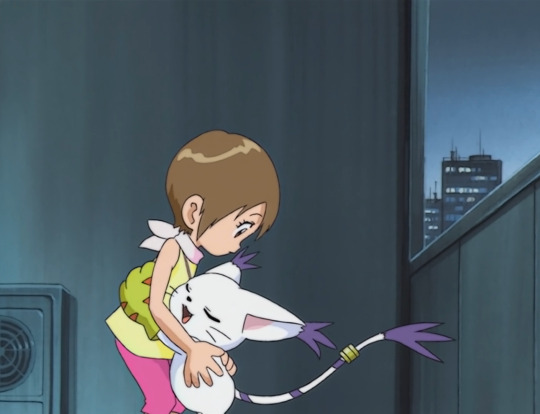
But Digimon Adventure isn't just the story of these eight children with valuable attributes that resonated among them. There are several worlds and a huge story beyond them: ancient prophecies, chosen children who came before, digimon who guide, fight, and protect. Characters like Gennai, Leomon, Orgemon, Centarumon, Piccolomon, Andromon, Elecmon, Whamon, and many more enrich the story, giving it more depth.


Also, digimon carry inherent attributes. Their potential is shaped not only by their data structure but also by the emotions, values, and environment surrounding them. One of the most interesting aspects is that digivolutions aren't fixed or linear. They often emerge from emotional triggers, moments of clarity, or strong bonds with their partners.
To understand this complexity, digimon are categorized in these ways:
1. Attribute: These act like behavioral alignments or data structures.
Vaccine: protective or heroic
Data: neutral or balanced
Virus: wild or destructive.
They can affect interactions and matchups in lore, like vaccine being strong against virus, but they don't define morality, a virus type can be as noble as any other, depending on its heart and context.
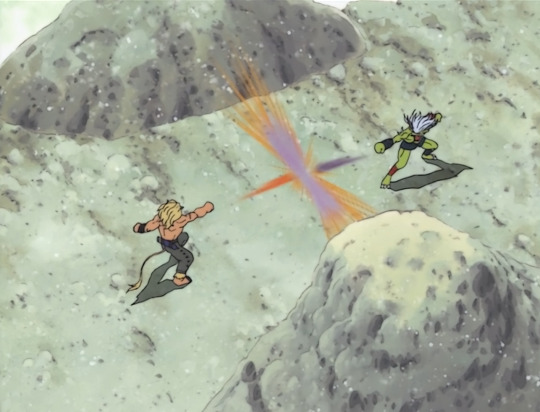
2. Level:
Levels go for example from:
Baby I: Botamon
Baby II: Koromon
Child: Agumon
Champion: Greymon
Perfect: MetalGreymon
Mega: WarGreymon
3. Species: Reptile, Beast, Insect, Pixie, Dragon Man, Cyborg, Holy Beast, etc.
This isn't a category but some digimon do have a sort of elemental theme. For example, focusing on the chosen digimon:
Tentomon and his evolutions often use electricity
Piyomon and her evolutions often use fire
Gomamon and his evolutions often use water.
These elements reflect more of a design choice or thematic identity than a fixed system. All of this reinforces that evolution in Adventure is driven less by combat rules or elemental progression and more by the environment, emotional resonance and the bonds between partners.

Taichi, your courage gives me strength.
The digivice is crucial, acting as a stabilizing bridge that amplifies the connection between a digimon and their partner. It safely channels emotional energy, enabling stable evolutions. Basically, the digivice is a conduit that converts courage, love, hope, and other powerful values into the digital energy a digimon needs to digivolve safely and in sync with its partner's heart.
The digivices and crests facilitate the connection between the chosen children and their digimon. Each digimon is an unconditional companion, almost like an extension of their partner's soul, while the children act as catalysts, allowing their digimon to reach their full potential.
An interest aspect is that digivolutions aren't permanent. Digimon can evolve and then return to a previous stage, which makes them feel more alive and emotionally complex. This cycle of evolution and deevolution reflects the fluidity of personal growth.
The crests represent the qualities that each one must recognize and cultivate. That's what I understood in episode 45, when the entity that spoke to the children through Hikari reminded them that those virtues had always been within them. However, their challenge wasn't just possessing them, but understanding and applying them. The crests and their circuits served as guides in that process, but even when they were destroyed by Apocalymon, each attribute remained engraved in the children's hearts, demonstrating that their growth was genuine and that those qualities were already part of them.
Each character's journey is defined by their core attribute: Taichi learns about true Courage, Yamato discovers Friendship, Sora understands Love, Koushiro is guided by Curiosity, Mimi embraces Purity, and Joe grapples with Reliability.
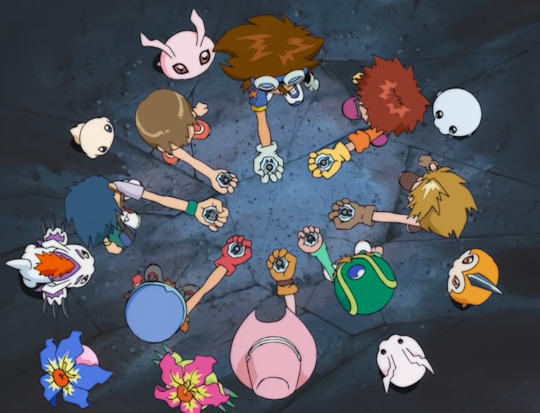
However, focusing on the adventure of the chosen children was, for me, a great choice. Their digimon are not only endearing, they are also their most loyal companions, those who push them to overcome their limits (special mention to Gabumon, who helped Yamato find his way when darkness threatened to consume him).
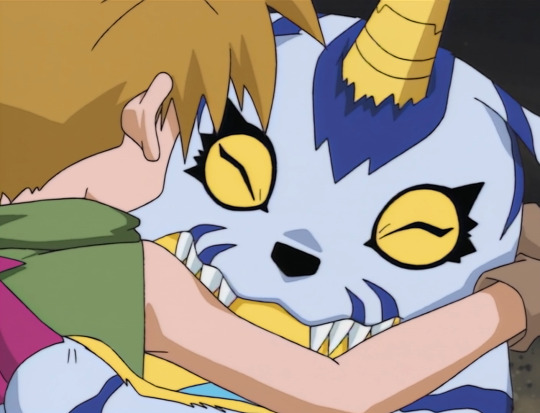
One of the pillars of the story is the relationship between Taichi and Yamato. Their personalities constantly clash, but behind their differences, there is respect, admiration and resonance. Taichi admires Yamato's determination and strength, while Yamato values Taichi's courage and leadership. Their conflicts reflect the weight of their roles and how, despite everything, their bond is unbreakable.

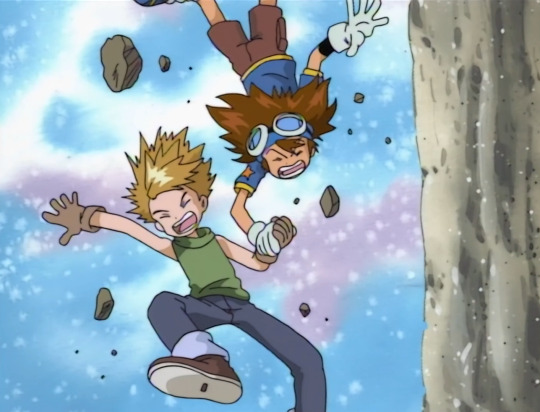
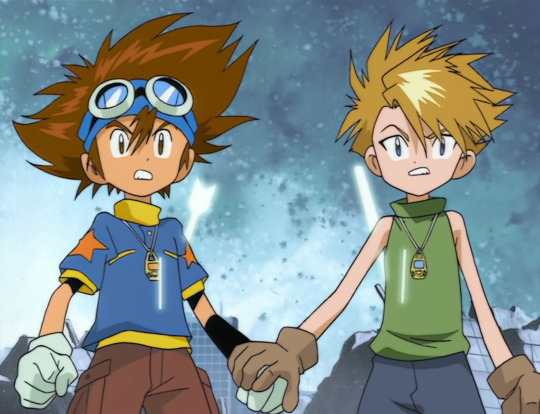
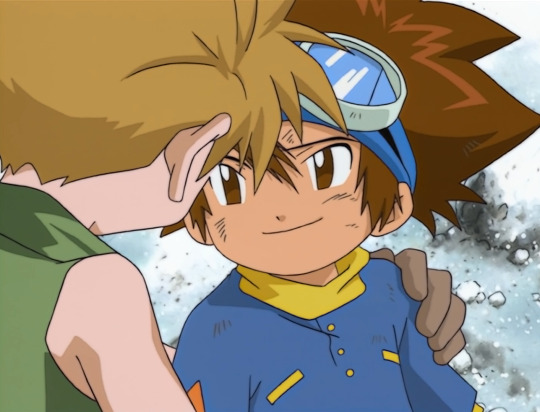
The children's journey began on File Island, where Devimon corrupted the island and we witnessed how sometimes the smallest can become the strongest, like Angemon, who emerged from Patamon and sacrificed himself to protect the chosen children.
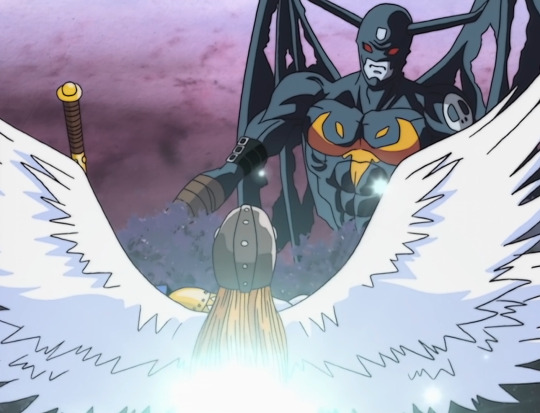
After that, they went to the Server Continent, where they met Etemon. He was defeated by Agumon's Perfect evolution into MetalGreymon in an intense battle which created a distortion in space, sending Etemon away and pulling Taichi and Koromon into the real world.
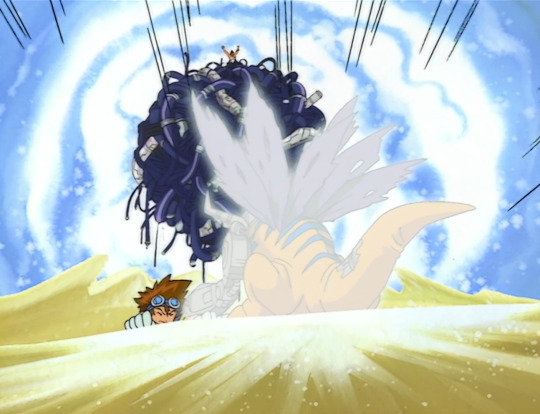
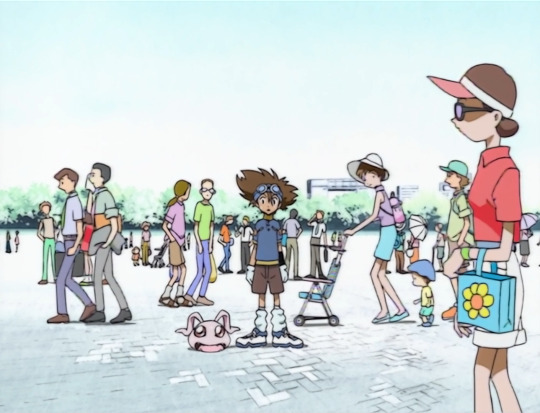
In the real world, Taichi and Koromon quickly realized that digimon were starting to appear and cause problems, though humans couldn't see them. This showed them that a serious crisis was unfolding in the digital world, and they needed to return to stop it.

When Taichi and Agumon finally got back, he found out that only half a day had passed in the real world, but almost a month went by in the digital world. While he was gone, a minion of Vamdemon, PicoDevimon, caused trouble among the scattered chosen children, who had separated after Taichi's sudden disappearance. Taichi and Agumon then worked to reunite them. As they came back together, every chosen child began to achieve their Perfect evolutions and prepared for defeating Vamdemon.
Their fight with Vamdemon was huge. He even managed to cross into the real world, wanting to defeat the 8th chosen child, Hikari. The children saved her, but their struggle wasn't over.
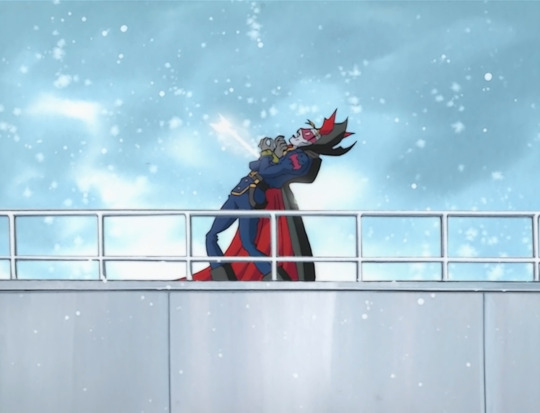
Gennai then shared an old prophecy:
"The sky will be darkened by the wings of many bats. The fallen people will invoke the name of the undead digimon king and when the clock strikes the hour of the beast, the undead king will reveal himself in his true form as the beast. Then angels will shoot arrows of hope and light at the loved ones of those they've been sent to protect, and a miracle will happen."
This led them to VenomVamdemon, who appeared in the real world. Koushiro figured out the prophecy: Taichi and Yamato needed to be hit by arrows of light and hope from Angewomon and Angemon to unlock the Mega evolutions of WarGreymon and MetalGarurumon. With the power of all the children's crests and their Mega digimon, they defeated VenomVamdemon.

However, a greater distortion spread across both worlds, and the digital world became even more chaotic. This was due to the vast time difference between the two worlds, while the children were in the real world, the true enemy had been causing chaos back in the digital world, and its effects were now spilling over into their own world. Realizing the danger, the children had to go back.

There, they faced the Dark Masters: Metalseadramon ruling the waters, Pinocchimon the forests, Mugendramon the cities, and their leader, Piemon. They beat each one, but it was a hard fight, and they lost good allies along the way.
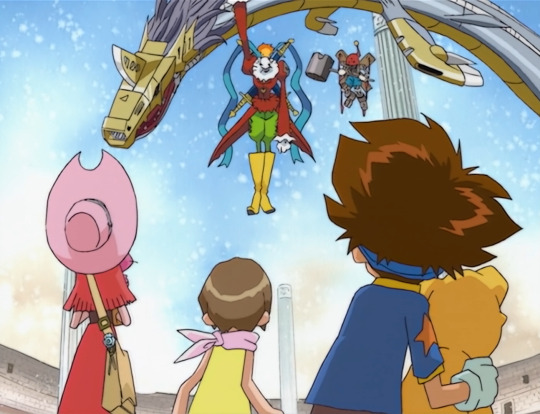
When they finally defeated the Dark Masters, the real enemy showed up: Apocalymon. This being, born from the resentment, sadness, and hatred of digimon who couldn't evolve, survive, or revive, was the reason for the huge spatial distortion that messed with time in the digital world and caused the climate changes in the real world. With their strong attributes, their digimon, and their digivices, the chosen children finally defeated Apocalymon, bringing peace back to the digital world and starting a new era.

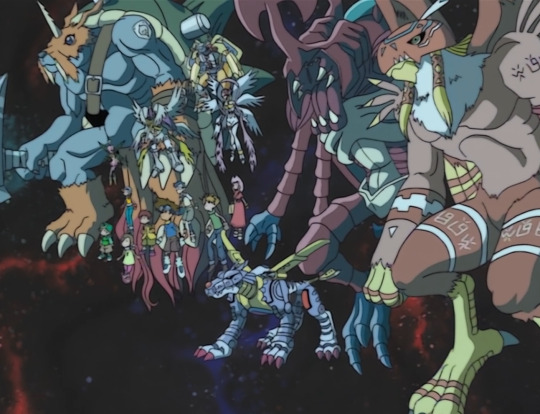
This victory, though, meant they had to say a sudden sad goodbye to their digimon partners and the world they worked so hard to save.


By revisiting this story I was struck by how meaningful it still is. It was a reminder that our values aren't fixed, we have to actively live by them and hold onto them to evolve.
And finally, something that should never be forgotten: The song "Brave Heart" is an anthem.
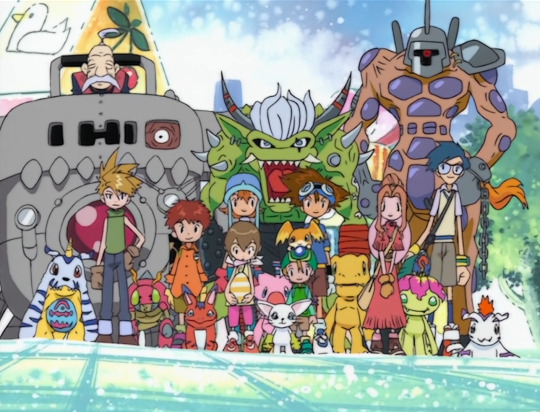
If you enjoyed this review and want to keep diving into the Digimon universe, I've also written full reviews of 02 and Tri.
You can check them out here: → Adventure 02 Review → Adventure Tri Review
#Digimon Adventure#taichi yagami#yamato ishida#sora takenoushi#mimi tachikawa#koushiro izumi#joe kido#takeru takaishi#hikari yagami#agumon#gabumon#piyomon#tentomon#gomamon#palmon#patamon#tailmon#centalmon#ogremon#gennai#elecmon#digital world#digimon adventure review#anime
18 notes
·
View notes
Text
Confrontations: Friendly Fire
Credit to resident art genius (and Donatello consultant) @trilobitepunch.
Keep your head centered, and shoulders down. Align hips, knees, and ankles to ensure even weight distribution. Space feet twelve inches apart…
“You good Don?” Raph whispered, his deep voice rumbling like thunder in the dense hush of the corridor.
“Fine,” Donatello replied, eyes trained carefully forward as stark gray walls loomed large and cold around them. Dull steel gleamed weakly in sterile light, painting the world in somber shades as the brothers moved swiftly towards their destination.
Arms to the side, hands open. Do not fidget or flex your fingers. Chin at a 45-degree angle to the chest. Eyes following the same line to the floor. Facial muscles must remain in neutral position three. No chewing of the lips, cheek, or tongue. Blinking limited to fifteen to twenty times a minute. Respiration rate will hold steady at twelve to eighteen breaths per minute.
“Ya sure?” Raph prompted; an emotion Donatello could not identify at the moment slipping hesitantly into his tone. “I know things got kinda crazy out there for you. I can give the report this-”
“No,” Donatello quickly cut in, neck muscles groaning with tension as he jerkily shook his head. “I already told you; I am fine. Further, you conveying the report will only arouse suspicions.”
“Oh…right.”
Keep your voice at neutral level one. Present the data, and only data. Maintain calm. Maintain control.
Carefully he gathered those volatile elements within him. Emotions, incomprehensibly sharp and barbed, hazardous as an untested solution. Once he had them, he reached for the box that he kept in the deepest recesses of his mind, the only other survivor of his time within the temple. It was a heavy thing, reinforced in layers of steel and will and sealed with a thousand locks. Its fathomless depths swallowed his burden, stripping away the unwanted and unnecessary to allow data to flow through his thoughts uninterrupted. The ache in his heart deadened, permitting his body to shift and morph in accordance with his thoughts.
“Everything is alright Raphael,” he assured, allowing himself the space of one heartbeat to feel relief as his words came out with the desired lack of inflection before he shut that emotion down too and locked it away with the rest. The door at the end of the hall loomed large, a maw reaching out to swallow them as they passed through “I will handle it.”
I will do this.
I can do this.
“Inquisitors.”
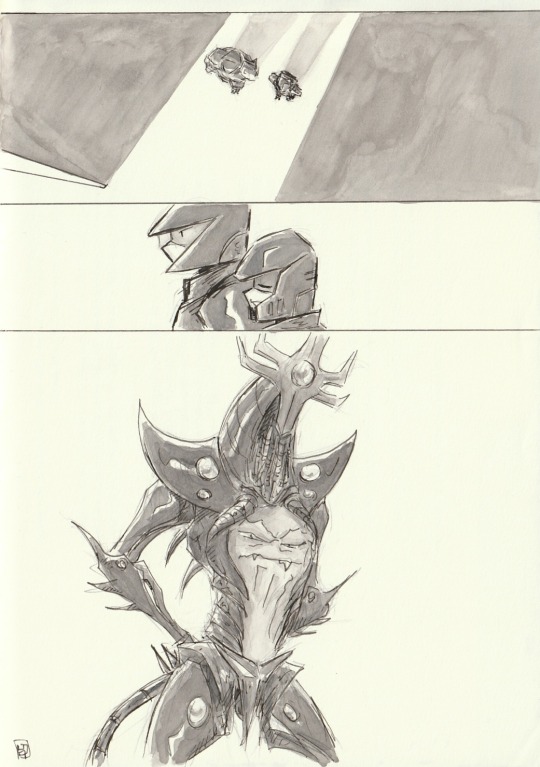
He bit down on the urge to shiver, steeling his spine as both he and Raph snapped to attention. He carefully kept his eyes forward and breaths measured as his superior’s exoskeleton stepped from the gloom of his inner office. Burning yellow eyes swept over them, a long mechanical tail lazily swiping from right to left as clawed hands folded behind his back.
“Inquisitor Krang,” they intoned together, dropping into identical salute that their leader dismissed with a lazy flick of his tail.
“Back so soon,” Krang mused, baritone voice dangerously light in comparison to the baleful red eye that glared unceasingly down at them.
The claws of one hand rose to casually trace his metal faceplate, producing a shrill screech that stretched the uncomfortable silence. Beside him Raph shifted slightly, discomfort evident as the permission to speak continued to be withheld, but Donatello resisted. His posture remained perfect, his face still and breathing metered as the sound assaulted his eardrums. He knew this game. He had played and lost so many times before. This time, this time he would win.
I can do this.
“Report.”
He closed his eyes and took half a step forward.
“Sir. Following the reports of possible Jedi in sector 4B, we deployed and identified two individuals. Upon confrontation…”
Carefully chosen words poured past his lips, a clinical and concise script that outlined events in as few details as possible.
I can do this.
In his mind the box shivered, the tiniest of cracks opening.
Mikey eyes reflecting fear and a lack of recognition for the strangers who shared his blood.
I can…
Leo, frozen. So close but so far…
No.
He pushed the images back, forcing them into the box.
I can do this.
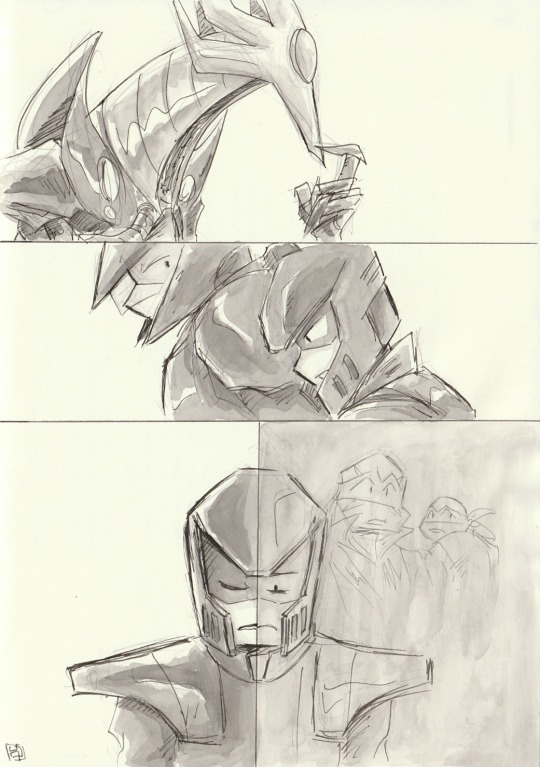
“…Neither target demonstrated force related abilities, even when pressed. It is possible that the informant was wrong or lied to curry favor with the Empire.”
“And where are these subjects now?”
“We were separated from them when the building came down. They escaped.”
“Oh?”
Such a soft syllable, yet it sent a bolt of icy fear through his gut. He forced down the urge to swallow as Krang turned away, claws rasping stridently against the floor. His shoulders hitched half a centimeter upward before he could stop them.
“Two potential force sensitives, ostensibly untrained, managed to thwart two fully trained inquisitors. Unusual, given the lack of displayed talent. Tell me more about these two subjects.”
“They-”
“Not you.”
Wh…What?
Lightning speared him, eyes flaring wide as his thoughts ground to a halt. In the corner of his eye Raph flinched, shock telegraphed for the whole galaxy to read.
“M-me?”
“Do I need to repeat myself?”
“N-no sir. Sorry.”
Raphael stepped forward, shoulder to shoulder with Donatello once more.
No.
This wasn’t right. Krang never asked Raph to report. Why was he asking Raph? What had he done wrong?
Stay calm. Stay calm. You can fix this, just…
“The subjects were like us. Looked and acted like they were siblings. The older one was Donatello’s height, bright green, with red crescent markings on his face and blue face mask. The younger one came up to the first one’s shoulder, was a darker green, and had an orange face mask.”
Sweat broke out along the back of his neck, the muted lights within the room becoming painful as the images of his twin and baby brother broke free from the box once more. His eyes slammed shut against his will, squeezing tight as he fought to push them back down.
He knows what they look like… oh force he knows what they look like.
Mikey’s sweet round cheeks, the left one smudged with hints of orange and yellow paints. Leo’s brilliant red crescents, his pride and joy, perfectly framing dark eyes that mirrored Don’s own.
Stay calm. Stay. Calm. It’s fine. Appearances can be altered. Breathe. BreatheBreatheBreathe. You can turn this around. You can do-
“And how did they act upon encountering you?” Krang prompted. Even with his back to them, Don could feel the weight of those eyes, yellow and red, bearing down to delicately carve his nerves from their protective sheaths. Pins and needles prickled down his arms and legs, stinging and nipping the tips of his fingers and toes as his armor chaffed against unbearably sensitive skin.
Don’t answer that, Raph. Don’t…
“They were surprised. The older one kinda froze up when he saw us. It was like he was looking at a ghost, or something. The little one seemed clueless and freaked out. He tried to get the older one to leave, but, uh, we moved to separate them. I took the little one, Donatello handled the older one. The little guy had a lot of agility. Looking back, that might have been from some force abilities. Not trained though. Kid was running on instinct. I didn’t see the older one fight, but he survived getting thrown around Donatello, so he could be-”
Don’tdon’tdon’tshutupraphhowcouldyou-
Nothisisyourfaultyourfaulthowcouldyounotprepareforthis?
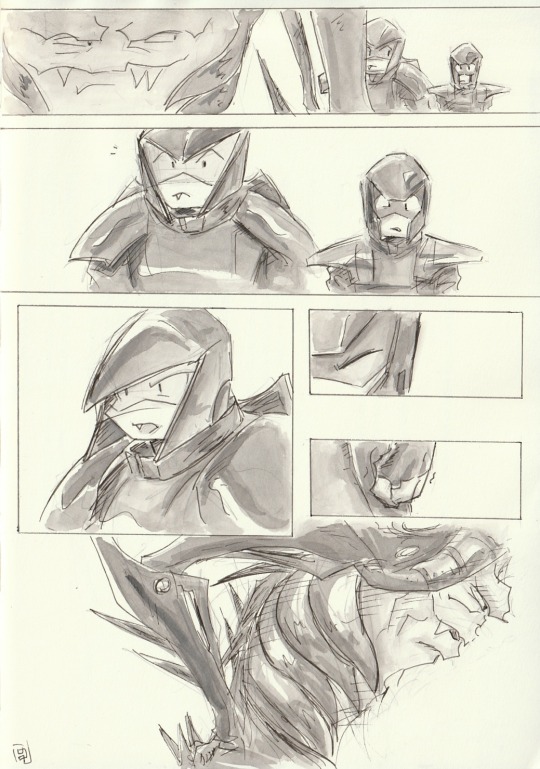
His hands clenched, nails biting deep into the meat of his palms in search of something grounding. An anchor against the sensations crawling through his veins like sludge.
StopstopstophowdoIstopthis?
The crack in the box grew a little longer.
Mikey. Effervescent and unguarded, brighter than a star. His baby brother, force signature bubbling with innocence and raw ability, defenseless against shadows that would snuff out his firework soul within a heartbeat.
Leo. Shattered and fragile and vulnerable within the force. No shields or walls to hide behind. A cracked shell that would be obliterated with a flick Krangs claws.
Donatello could not let that happen. And that meant he had to pull himself together.
He forced himself to suck in a subtle breath, ignoring how the air shredded his throat on contact.
Calm. Down. You are probably giving away more than Raph is at this point. It’s just Krang playing games to get under your skin. Stop giving in. All these details are inconsequential so long as he does not have the context to put it all together. He doesn’t know. No one knows. And that gives you the advantage.
"Interesting," Krang purred as he turned back to them, slit pupiled eyes flickering over Donatello’s body as though it were a particularly intriguing holopad.
He does not know. Breathe. Stay calm. Don't give in. He doesn't know. He can't know...
Krangs smirk deepened to as he caught and held Donatello’s gaze, a cruel sneer that shone with wicked delight as his superior’s gaze then slid pointedly to Raphael.
"Very interesting."
He knows...
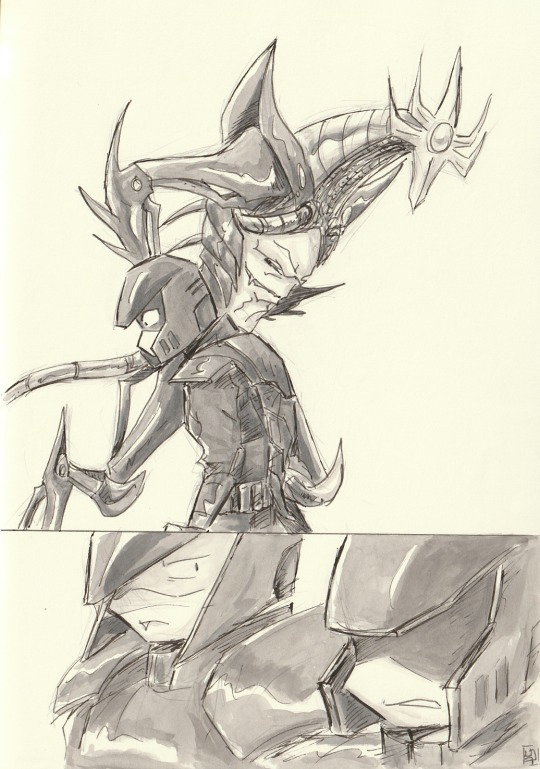
All the air in the room disappeared, evacuating his lungs as a wave of terror swallowed his thoughts. His limbs locked; muscles durasteel ridged as Krang sauntered away. The lights in the room were lasers, piercing flesh, and bone to shred his brain. Every tap of Krangs claws crashed against his ears like cymbals, deafening him to all but the pounding of his heart. In his periphery Raph’s gaze bore down on him, the silent questions within it pinning him down as the guillotine hung high overhead, doom preparing to drop.
“Your failure might have revealed a unique opportunity,” Krang mused, the barb at the tip of his tail flashing like a knife as he strode back towards his desk. “I must decide the best course of action regarding it. Your punishments will have to be decided later.”
“Yes, sir” he mumbled, the words barely whispering past his lips as his throat threatened to close around them.
“You two are temporarily dismissed.”
#rottmnt#rottmnt x sw#rottmnt synthesis#rottmntfanart#rottmnt donnie#rottmnt raph#rottmnt krang#angst fairy writes#rottmnt has the best version of Krang#mostpunchablebubblegum#He knows all the ways to get in Donnie's head#and he enjoys it
78 notes
·
View notes
Text
Her || Charles Leclerc
Main characters: Charles Leclerc x OC Genre: fanfiction, fluff Story type: novel Part: 36/45 Word count: 2722 Co writer: @mistrose23
Story summary: Matilde Jørgensen, the new Scuderia Ferrari team principal, faced the nerve-wracking challenge of reviving the team's fortunes and aiming for a championship. Leading a historic team as a 'newbie' and separating her work and personal opinions posed a significant challenge. The big question: is she capable to do so?
Previous chapter
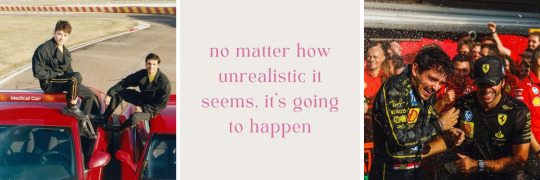
Chapter 34. Good Things Take Time
After the photoshoot, Matilde was whisked away to a smaller, more casual setup for her next task, recording a light-hearted "This or That" video for social media. It was a quick, fun segment, the kind that humanised her beyond the world of motorsport. She smiled easily as she answered questions about her preferences; sneakers or heels, city or countryside, pizza or pasta, Denmark or Italy, giving a glimpse into the side of her rarely seen by the public.
Once the video was wrapped up, Matilde was invited for a sit-down interview with the Vogue journalist. It was a refreshing change of pace. Instead of the usual technical questions about race strategy or team dynamics, she was asked about fashion, lifestyle, and her life back in Denmark. Matilde found herself smiling as she talked about her personal style, the simplicity of Danish living, and how she balanced the high-octane life of Formula 1 with her grounding roots at home.
But the solo session didn't last long. Soon, Charles and Carlos would join her for a group interview. The three of them would chat about their relationship on and off the track, the team dynamic, and how their shared experiences shaped the unique bond that had formed within Ferrari. Though this part of the interview was still for Vogue, it felt different, less personal, more playful, and filled with the camaraderie that the world had come to admire in the trio. All of it was perfectly suited for the upcoming issue.
"What is it like to have Matilde as team principal?" the interviewer asked.
Matilde glanced between Charles and Carlos, her eyebrow raised in amusement as she waited for their responses. The interviewer's question hung in the air, and a playful tension settled over the room. "You can speak freely," she said with a teasing smile, though her eyes showed a glint of challenge.
Carlos chuckled, his arms crossing over his chest as he leaned back in his chair. "Talk about the boss in front of the boss," he repeated, laughing as if the very idea amused him. "Dangerous territory."
Charles shot Matilde a quick, mischievous look before leaning forward, elbows on his knees. "It's always tricky when the boss is right here, watching your every word." He winked at her, then glanced back at the interviewer. "But, honestly, she makes it pretty easy. She's got this calm authority. You just know she's always in control, even when things get intense during a race weekend. But she's also approachable, which is rare. You don't always get that balance."
Carlos nodded, joining in. "Yeah, to be fair, it's been... different, in the best way possible. She brings a whole new vibe to the team. It's like she knows when to be strict and when to let things flow."
Charles jumped in, his expression growing more thoughtful. "She's not just about the numbers or the data. She's got this... human element. She actually cares about how we feel going into a race. I think that's rare, especially in F1. You don't always get a team principal who's as invested in the drivers, not just as professionals but as people. And she really listens; to the crew, to us, to everyone. It's like she sees the whole picture, not just what's happening on the track but behind the scenes, too. For example, every Monday morning she starts with a round through every department to listen to everyone. It doesn't matter if it is something positive, negative or personal, she always asks how you're doing."
Matilde sat back, listening, trying to hide her smile, through her eyes softened at their words. She didn't like to be the centre of attention, but hearing the honesty in their voices made her feel a deep sense of pride.
Carlos, never one to miss an opportunity for humour, leaned toward the interviewer with a grin. "But let me tell you, when she's not happy, you'll know it. She's got that quiet 'I'm disappointed' look that's worse than any lecture. Makes you want to crawl under the car."
Charles laughed, nodding. "Yeah, it's worse than if she actually yelled. But it makes us want to push harder, you know? Because you don't want to let her down."
Matilde couldn't help but interject, shaking her head slightly. "I didn't realise I was so terrifying."
Carlos laughed again, shaking his head. "It's not that! You're just... let's say, motivational. You set the bar high."
"And do you know what I also love about you," Charles continued. "As team principal," he quickly added for the show. "Wait, let me get my phone." He grabbed his phone from the pocket of his trousers. "At the end of every email, below your signature, there's a note that says: Well being note: Receiving this email outside of normal working hours? Managing work and life responsibilities is unique for everyone. I have sent this email at a time that works for me. Please respond at a time that works for you. I just love that."
A shy smile grew on Matilde's lips. Of course, she put that in her emails for a reason, but she didn't think people would actually notice it. No one had said anything about it. But apparently, people noticed it.
"Whenever I read an email from you, outside of the office hours, I am being reminded that I shouldn't even look at my email to begin with," Carlos added.
Matilde smiled at Carlos' remark, nodding thoughtfully before turning her attention to the interviewer. "I think it's important to have a no-work policy outside of work," she began, her tone steady yet passionate. "Outside of the job, we all have lives, families, and things that help us recharge. And just because I'm sending an email at odd hours - which, honestly, I shouldn't be doing - doesn't mean anyone else should feel obligated to respond." She glanced at Carlos with a knowing smile. "Our work is intense, high-pressure, and there's always a new race or a new challenge. That's why 'me time' is crucial. It keeps us balanced."
The interviewer nodded, impressed. "It sounds like you're setting a great example, not just for the team but for the work culture in general. How is it for you to work with Charles and Carlos?"
Matilde paused, the question hanging between them. Her gaze shifted briefly between Charles and Carlos, who both wore relaxed, curious expressions, waiting to hear what she had to say. "It is a privilege," she smiled. "They're incredibly talented drivers, obviously, but more than that, they're driven, passionate and smart. They both bring unique energy to the team."
While listening, Charles remembered the first interviews of Matilde; she had neutral answers back then. Now she gave personal answers, still neutral and media approved, but now with a personal touch.
"I'm still their boss, but I feel like we also can make fun and enjoy the time while working. And I think that makes it just more precious to work with them."
"Do you struggle with the boundaries of being a team principal and a colleague, a friend? A few weeks ago, you received quite the backlash for being too present as a friend instead of their leader."
Matilde's smile remained, though a flicker of thought passed through her eyes as she absorbed the interviewer's question. She didn't shift in her seat, but there was a slight pause as she considered her words carefully. The question was direct, and the interviewer wasn't shying away from the controversy. "I'm still their boss, I will be their boss," she repeated, her tone steady, "but I do think it's possible to find a balance between being a leader and being approachable. Yes, we make jokes, we laugh, and we enjoy the process, but when it's time to get serious, everyone knows the expectation."
Charles shifted slightly in his seat, sensing the shift in the conversation, but he remained quiet, eyes trained on Matilde as if he, too, was curious about how she'd respond.
Matilde's voice remained steady as she continued, though there was a certain openness in her tone now, a willingness to acknowledge the journey she and the team had undergone. "I won't deny it," she said again, her gaze direct. "I've seen the criticism, and I understand where it's coming from. In Formula 1, or any high-pressure environment, there are expectations about what leadership should look like. Some people think a leader has to be distant, untouchable, and always in control from afar. But that's just not my style." She paused for a moment, gathering her thoughts, then added with a small smile, "If I can speak for my team... We struggled a lot in the beginning to find a way to work well together. I come from Denmark, where things are pretty down to earth, and on the work floor, everyone is more or less on the same level. Of course, there are boundaries and hierarchy, but not strictly or rigidly. You can be the boss and still be approachable, still be seen as a colleague." Matilde glanced briefly at Charles and Carlos before continuing. "I worked in England before I came to Italy, and while it was different from Denmark, the hierarchy wasn't overwhelming. But when I first arrived here, to this team in Italy, I experienced something quite new. The hierarchy was strict, almost rigid. At first, we clashed, a lot. There were misunderstandings, moments where we didn't quite get each other's ways of working. And that's fine because it was part of the process."
The interviewer leaned in, intrigued by her openness. "And how did you overcome that?"
Matilde's smile softened, her expression reflective. "We learned from it. We talked, argued, and made mistakes. But in the end, those clashes helped us build something better. I adapted my way of working to the team, they adapted their way of working to my style. It's about giving and receiving. We learned to respect the differences in culture, in leadership styles, and in approaches to teamwork. And now? We've created a fantastic team dynamic that I'm really proud of. It wasn't easy, but it was worth it. Good things take time."
"I'm glad we found a way," Carlos said and padded Matilde's shoulder.
"How is it for you to be present at the track at every race now? During your last position at Red Bull Racing as strategist, you worked only a few races a year at the track, then every other race at your homebase."
It was silent for a few seconds, giving Matilde a few spare seconds to come up with an answer. "It's different for sure," she replied. "You feel the energy, the pressure, and the excitement in a way you just can't from behind a desk. But it's also exhausting, being on the move constantly, always in the thick of things. It's a different pace, and it took some time to adjust."
Carlos leaned forward, nodding in agreement. "Yeah, she's everywhere now. It's like she's in ten places at once, from the garage to the pit wall, checking in with the engineers, with us, making sure everything's running smoothly."
"What is your favourite track you have visited so far? One for the atmosphere and one for the race," Charles asked.
"Oef," she breathed. "I would say for the race Monza, also for the atmosphere, nothing beats the home race. But for the atmosphere only... Zandvoort. I mean, the Dutch, F1 and parties? So no more. And I met the Dutch King and Queen, how delighted? I never met royals before. Being the team principal gave, gives, me the opportunity to meet so many special people."
"And how do you feel about that? Being in the centre of attention within even famous people?"
Matilde caught Carlos' grin out of the corner of her eye and couldn't help but smile in return. She knew he was waiting for her answer, maybe even expecting her to brush off the question. But she leaned into it, keeping her tone light but genuine. "Well," she began, "I'm not exactly someone who seeks out the spotlight. Being in the centre of attention is... different for me. I mean, I've always been more comfortable behind the scenes; analysing strategy, working with the team, making decisions without the cameras rolling." She glanced at Carlos, knowing his playful nature. "But being around famous people, the cameras, the media... It's part of the job now. I've had to learn to adapt, and honestly, I'm still adjusting. It's a strange feeling to be recognized or have your opinions scrutinised so publicly."
Carlos was still grinning. "Yeah, but she handles it like a pro. You wouldn't know she's not used to it." He turned to the interviewer, raising his eyebrows in mock surprise. "You see her with the celebrities, the media; cool as ice. But as soon as she gets behind the scenes, even behind the back of the concerned person... She freaks out."
Laughter filled the space.
"Nah..."
"No, no, no," Carlos said. A giggle left Matilde's mouth and she covered her face with her hands. "She may be a team principal and an inspiration or celebrity to many people. But when she meets famous people, she doesn't know what to do." Carlos teased, glancing at her with a grin. "At Monza, she was practically hyperventilating. Louis Tomlinson asked for her, and she had tears in her eyes when she told us about it afterwards. And don't even get me started on Damiano from Måneskin. Total fangirl moment." Matilde couldn't help but laugh behind her hands, but Carlos wasn't done yet. "Or Ben Hardy, and the guy who plays Matthew in Downton Abbey-"
"Dan Stevens," Matilde filled him in. She put her hands on her cheeks so people couldn't see her blush.
"Him, yes, they were in Japan and she met them before we had a briefing," Carlos smirked. "I remember, she walked into the room after meeting them with this massive smile on her face, tears in her eyes, and she was shaking."
"And let's not even start with Patrick Dempsey," Charles added with a grin, causing Matilde to shake her head in protest.
"Obviously, it's McDreamy," she replied. "They're all so famous to me, and I'm just... doing my job," she said defensively, her voice slightly higher with flustered energy. "Of course, I'm going to freak out when my celebrity crushes are standing in front of me! What do you want me to do?" She looked at both Charles and Carlos with a mock-serious expression, trying to regain her composure. "'Hi, I hope you're enjoying your time here?'"
Charles and Carlos exchanged a look, both mimicking her serious tone as they replied in unison, "Exactly like that."
"Oh, shut up," Matilde groaned, making them laugh. "They are like... Certainly, you don't have celebrity crushes. Of course, I fangirl when I meet the big names."
Charles looked playfully at her. "What did you do when you met us? Did you freak out as well?" he cheekily asked.
She looked in front of her, her face straight. To her, it gave her some time to come up with an answer. To the boys, she answered the question.
"Good to know," Charles nodded, like he was glad to get this information.
"I did freak out," Matilde finally confessed with a dramatic sigh. "Because you're Ferrari; two big names in the sport. What do you want me to do? Act casual? No way. I was excited, and yes, my heart skipped a beat. To me, you two are big names. Of course, I had a moment." She didn't want to smile, but the laughter of Charles and Carlos made her smile. "What about you? Did you ever freak out because of meeting a celebrity?"
Carlos shook his head with a confident smirk. "No, honestly, no. I'm always pretty chill about it."
"When I met you," Charles playfully said. "The big new team principal of Ferrari."
"Oh, shut it."
The interviewer let the conversation flow between the three. Within a split second, she decided this part of the interview would be a conversation interview and she was content with it. Never had she seen a dynamic between a boss and her employees like this. As a Ferrari supporter, she finally began to see why the team worked well under Matilde. At first, she didn't get the decision and she had to adjust to Matilde - just like a lot of Ferrari fans in Italy, but Matilde was managing really well.
Next chapter
Taglist: @itsjustkhaos @crashingwavesofeuphoria @maryvibess @ironmaiden1313 @blodwyn4u @sltwins @heart-trees @npcmia @llando4norris
#charles leclerc#f1#formula 1#ferrari#carlos sainz#carlos sainz jr#max verstappen#kevin magnussen#fanfic#motorsports#formula one#charles leclerc x oc#fluff#charles leclerc fanfic#charles leclerc fluff#scuderia ferrari#Charles Leclerc fanfic#Charles Leclerc fanfiction#formula 1 fanfic#f1 fanfic#f1 fanfiction#formula 1 fanfiction#f1 fic#charles leclerc imagine
31 notes
·
View notes
Text
Hit and Fade
“Hmm…”
Ton Lee Sama looked through her electrobinoculars, focusing them in a little, then nodded to herself.
There was no mistaking it. That was a Star Destroyer, in high orbit over Cabarria, along with a pair of smaller escort ships.
There wasn’t any news on the HoloNet that suggested there was going to be a crackdown, or anything like that… which was fortunate… but Ton Lee wasn’t a Rebel, anyway.
She didn’t do that kind of thing.
Instead, she went back inside, then picked up a comm system.
Ton Lee didn’t take part in any forbidden activities. She just watched the sky, and told others what she could see.
“Someone please tell me the caff machine is fixed,” Commander Harkon requested, entering the bridge.
“It’s been fixed for two watches,” Lt. Dax informed him.
“Thank goodness,” Harkon muttered. “All right – I have the conn.”
“You have the conn, sir,” one of the other officers said.
“Now tell me if anything’s wrong,” Harkon added. “And someone get me some caff.”
A rating went to go and fetch the commander’s coffee, and the woman who’d been watch-standing before him shook her head.
“Nothing of any significance,” she replied. “We’re in medium orbit, same as before.”
“Good, good,” Harkon said, hands clasped behind his back, and looked out the window. “I see there’s a patrol out.”
“Of course, Sir,” the woman told him. “Regulations.”
“Quite,” Harkon agreed. “Quite.”
He accepted his cup of caff from the rating, nodding his thanks, and took a sip.
Then another.
“This actually tastes slightly better,” he said. “That or I’ve had so long without a caff machine that I didn’t realize quite how much I was missing it.”
That got a few desultory chuckles, and Harkon paced around the bridge for another minute or so, sipping his drink occasionally.
“Lieutenant,” he said, looking down at Dax. “Your assessment is tomorrow, correct?”
“Yes, sir,” Dax agreed. “I’m nervous.”
“As you should be, it’s an important moment,” the higher-ranked officer said. “But you’re quite competent enough to advance – you just need to make sure that the Captain sees that.”
Dax nodded, thinking about that, and the background murmur of operations of the ISD Galaxion flowed back and forth around them.
Then a raised voice cut the calm.
“Sir!” someone in the bridge pit said. “Enemy fighters!”
“Where?” Harkon demanded, practically dropping his half-empty cup as he looked around for clarification. The alert sirens began to wail, and one of the nearby displays flashed.
“Behind us!” the rating answered. “Patrol is vectoring-”
“What kind of fighters, I need data-”
“Prepare the ready squadron for launch-”
The quiet calm of an evening shift turned into focused cacophony, men and women struggling to do their jobs in a way that had suddenly become urgent, then Harkon saw two three-flights of X-wings slash past either side of the bridge. One of them was just finishing the job of picking apart a two-flight of TIE fighters from the combat space patrol, then they corkscrewed and turned towards another element of the patrol.
Defensive laser turrets began to open up, a few at a time as the systems came online from crews dashing through abbreviated start up sequences, and Harkon’s head swung back and forth as he tried to keep track of everything.
“Someone wake the captain!” he snapped. “Tell Outrage and Kismet to move in closer! We need their guns-”
The whole of the Galaxion shook, and electrical discharges snapped and crackled around the nearest consoles. One of them exploded, sending the rating operating it sprawling, and someone shouted for a corpsman.
Harkon tried to ignore it, but a moment later lights began to shut down and the defensive gunfire stopped.
“Report!” he shouted, spotting half a dozen Y-wings banking around with their turrets flaring – a single skilled TIE pilot trying to interfere with their bombing run, but ion cannon bolts disabled the fighter and a moment later an X-wing downed it in a shower of sparks.
“Ion bombs, sir!” Dax reported, from his post in the engineering section. “At least a dozen, we don’t have the exact numbers – the reactor’s gone into shutdown, I don’t know when we’ll get it restarted!”
Half a dozen other conversations were going on, shouted reports about what little information they had with the whole of the Galaxion running on emergency power only, and Harkon winced as an X-wing flew right past the bridge.
“Lieutenant Dax,” he said. “Personal comlinks should still work – get me a report from engineering!”
“Yes, sir!” Dax replied, then listened to a comlink for a moment.
Harkon made himself wait, looking out the armoured bridge windows as he watched the fighting. One of the X-wing flights seemed to be focused on the hull guns of the Galaxion, clearing away turrets while they were unpowered and the shields were down, but the Y-wings were going for their escorting Acclamators – and there were X-wings following them.
How had they… the strike must have been made with some kind of interim rendezvous. With current enough data you could jump in close to a target point…
“Sir!” Dax called, getting his attention. “Commander Keres in engineering says he’s going to try a hot restart. If he can catch it before it’s fully cold then we’ll have power in less than two minutes – otherwise it’ll show him where the damage is!”
“Tell him to be as quick as possible,” Harkon said, then there was a crackle from his own comlink.
He snatched it up to his ear. “Bridge here.”
“Bridge, this is the flight deck,” Commander Perrin reported. “We’re trying to get our fighters in space, there’s problems with the handling gear and the armoured hatch is locked in place. Permission to deal with that problem?”
Harkon froze, thinking hard.
The flight deck hatch was armoured for a reason.
“Can’t you launch through the landing bay?” he asked.
“Transfer from landing to launch and vice versa is by an automated system, and I’m using all the emergency power I have to start up TIE engines!” Perrin said. “Do you want fighters in space ASAP or not?”
“Be ready for it, but don’t do it just yet,” Harkon said. “Reactor restart is going to be attempted-”
The Galaxion shook slightly.
“Engine flare and shutdown!” Dax called. “Commander Keres says there’s serious ion scarring on the control lines – we won’t get the main reactor back until that’s sorted!”
Harkon winced.
“Do it, Perrin,” he said.
“That’s all I needed, bridge,” Perrin replied, then the line went dead.
Scowling, Harkon looked out the window again, seeing laser blasts and explosions going on around the Outrage. Several TIEs exploded as he watched, shield scatter blazing off the Rebel fighters, then at least one shielded Rebel snubfighter went down as well – but a moment later there was a much brighter explosion, as Outrage exploded from a sequenced barrage of at least a dozen torpedoes.
At least it looked like Kismet was cycling her hangar launches quickly, as there was now a second flight of TIEs coming out of the hangar. That was probably it for how many fighters he was going to get.
“TIEs launched!” someone called, then their tone changed. “Enemy space patrol around the ventral side of the ship – they’re being shot down as they come out!”
“What in blazes is going on?” Captain Jered demanded, striding onto the bridge.
Harkon turned, ready to answer, then someone shouted.
“TORPEDOES-”
The whole of the Galaxion heaved upwards, like she’d just been hit by an asteroid, and everyone on the bridge who wasn’t already seated ended up sprawling.
“Report!” Captain Jered said, picking himself up from the floor. “Torpedoes where?”
“Ventral side, X-wings,” someone said, sounding shaken. “I don’t have any reports from the flight deck…”
“Engineering reports serious damage to the spaceframe, sir,” Dax added. “I think…”
“Continue, lieutenant,” Harkon instructed him.
“I think their torpedoes blew the bomber magazine,” Dax said. “If that’s happened… the spaceframe is a wreck. Commander Keres says the frame shift has warped the reactor as well – he doesn’t think he can fire it up at all.”
The engineer swallowed, suddenly sounding very young. “Atmospheric integrity is compromised across most of the ship, the blast doors won’t seal.”
“Damn,” Jered said, very softly.
He was silent for perhaps ten seconds, watching out the window as the Rebel starfighters downed the last few TIEs in the battlespace. Kismet was gone, Harkon noticed – destroyed while he’d been focused elsewhere – and the Rebel starfighters recohered into three-flights and then squadrons, before vanishing in a flare of pseudovelocity as they jumped to hyperspace.
“There’s nothing for it,” he said. “Abandon ship. And make sure to preserve the data recorders… we’ll need them for the court-martial.”
27 notes
·
View notes
Text
Essential Elements of an Unlimited/Infinite Flow Story
As someone attempting to write my own Unli Flow, I thought I’d take note of the different elements so I can have a guide I can always refer back to.
I’ve explained what Unli Flow means many times before, but in case you missed it: Unlimited/Infinite Flow is a genre in Chinese web novels that feature characters entering multiple “instances” where they have to complete a challenge and/or solve a mystery. Failure in doing so would lead to consequences, most often death.
There’s also this definition by AshuraYami from the NovelUpdates Forum:
Unlimited Flow/Infinite Flow is a genre originating from the CN novel Terror Infinity. The genre mainly revolves on world hopping involving fictional works (anime, comics, movies, games and novels) and/or original worlds created by the author. Infinite Flow, as it’s ‘infinite’ namesake suggests, can accommodate all other genres, be it fantasy, sci-fi, horror, romance, etc. Representative works are Terror Infinity (origin of genre), Reincarnation Paradise (most chapters and word count), The Ultimate Evolution (promoter of data flow, an infinite flow derivative that is more game-like litRPG) and Thriller Paradise (most famous horror infinite flow).
With the definition out of the way, let’s goooo
[This post will also serve as a rec list of sorts, since I’ll be giving examples of each element from different danmei novels.]
----------
1. The Authority
The entity/system in charge of the Unlimited Flow system as a whole. Most stories just chalk it up to the Unli Flow being some kind of otherworldly being/extremely advanced AI that just likes to mess with people.
Examples of The Authority
(based on what I remember, at least… Also, beware of spoilers)
The Earth is Online: The Universe
Mist: I forgot what it’s called, but that high tech system in charge of all the Time Traveling stuff...
High Energy QR Code: That black and white cube thing
Surprise! The Supposed Talent Show was Actually—?!: … The TV station...
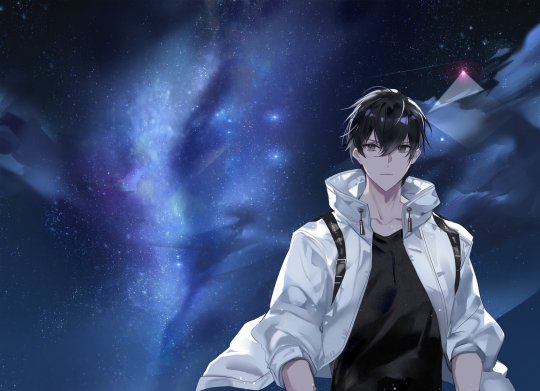

From left to right: Tang Mo from The Earth is Online and Wu Jin and Wei Shi from Surprise! The Supposed Talent Show was Actually—?!
[Spoilers End]
From having read numerous Unli Flow stories, I conclude that crucial to a great, not just good, Unli Flow story is a well-defined Authority. The explanation behind the Authority’s existence and motives is the foundation to the entire story.
You can have a very fancy building (cool instances, well-developed characters, an exciting enemies to lovers couple, etc.), but if the foundation is flimsy, the building’s value would plummet in your eyes. You can still appreciate the building, of course, but you will never be content with it.
Examples of some novels that are good in almost everything else except The Authority (in my opinion): [spoilery]
Supernatural Movie Actor App: It was too profound with not enough groundwork laid for it, resulting in The Authority feeling detached from the main story.
I Upended Yet Another Campus Urban Legend: The Authority was not exactly bad; it was just inadequate. The justification of the Unli Flow existing became unconvincing because of this.
Escape the Infinite Chamber: THE AUTHORITY IS SO FUCKING RIDICULOUS THAT IT’S ABYSMAL. And the entire thing was explained in just one scene and from one extra??? SO MUCH PAIN AND SUFFERING AND THAT’S THE ONLY EXPLANATION WE GET??? HORRENDOUS!
[Spoilers End]
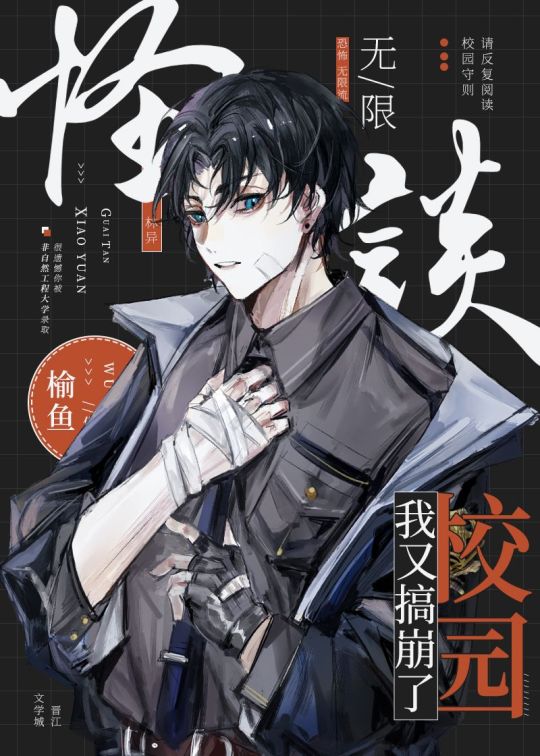
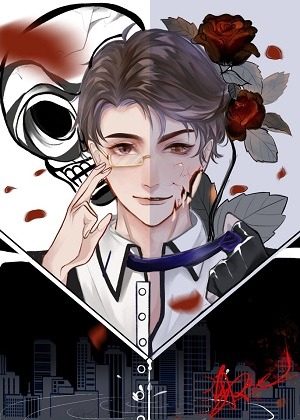
From left to right: Book covers of I Upended Yet Another Campus Urban Legend and Supernatural Movie Actor App

2. Instances
Also known as “copy.” The other world/dimension where players have to face the different challenges.
The Authority may be the foundation, but the Instances are the defining aspect of the Unlimited Flow.
A lot of novels, however, are quite perfunctory when it comes to instances, just using it to further the main couple or as a mere stepping stone to the overarching plot. Or, if they’re not being perfunctory, then the Instances are just plain boring.
The first instance, especially, tend to be the most boring. Authors often use this to dump all the information about how their unli flow works. This usually gets better by the time the 2nd or 3rd instance comes around....
Upon successful completion of an Instance, players will then be rewarded with either points, special abilities, magic items, etc.
Examples of novels with GREAT instances (based on logic, thrill, horror, etc. Again, all in my own opinion):
I Became a God in a Horror Game: The horror is present all throughout. I can still remember the fear I felt while reading about the statues in the first Instance. Each instance/arc also emotionally impacts you, an effect that most Unli Flow writers don’t really aim for or just generally tend to fail at. (This is also my favorite unli flow novel at the moment~)
The Earth is Online: (same author as Fourth Perspective, which I’ve posted a lot about before) What I love about Mo Chen Huan, the author, is how they write intelligent MC’s but without making them seem too OP. And this is because she actually shows us the MC’s thought process, inviting us to think along with them and figure out how to solve the challenge, and not just make her characters say “aha!” This is what makes the Instances in TEIO great and memorable.
High Energy QR Code: The story could make use of more showing than telling, but I actually love the Instances in this novel. You know how good stories are often described as a well-made tapestry in that every little thread contributes to the big beautiful picture? That’s how each Instance reads in this novel. (Absolutely love the Instance about the town where everybody lies.)
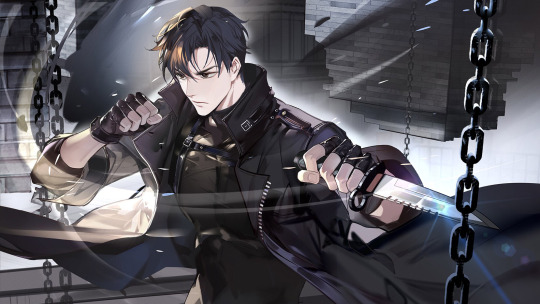
Fu Wendou, the male lead of The Earth is Online

3. NPCs
A gaming term which stands for “Non-Player Character.” Refers to characters who live within Instances and act in such ways that further the plot or challenge presented by the Instance. They may go against players or assist them. May or may not have a will of their own.
Examples of NPCs:
Xu Beijin, the protagonist of Being an Extra Actor in an Escape Game
Lu Chu, the protagonist of Insider.
The iconic Mosaic from The Earth is Online
The male leads from Escape the Infinite Chamber, I Became a God in a Horror Game, Killing God with Junk Cards, etc. (Most danmei ML are special!NPCs 😩)

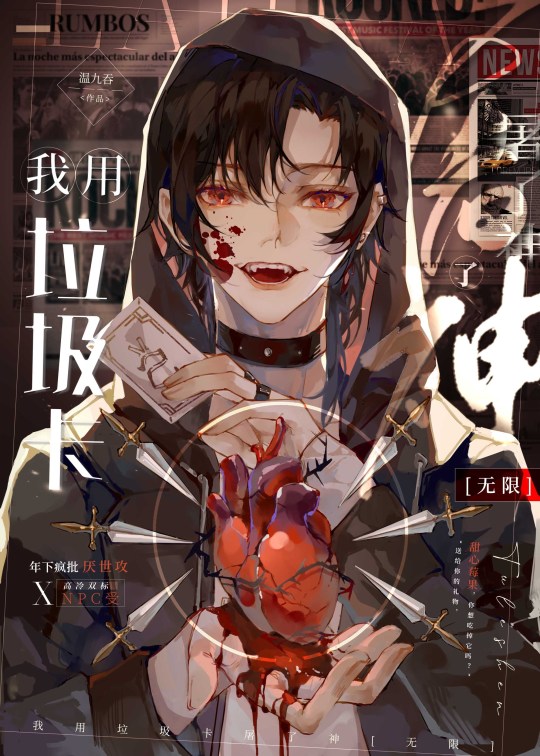
From left to right: Book covers of Being an Extra Actor in an Escape Game and Killing God with Junk Cards

4. Player Hall
A space outside of instances where different players can gather and exchange information. Most of the time, this is in a space still separate from the real world. Players are often prohibited from using their powers in this space.
In some novels, Players have no choice but to live here, completely cutting them off from the real world. In this case, accommodation quality will depend on the Player’s level or points.

5. Personal System
The Personal System issues challenges to the player and keeps track of their current attributes, physical and mental states, etc.. It also calculates rewards and punishments for the player. First and foremost in service to The Authority. (If they aren’t, then they’re most likely the Love Interest in disguise. If not, the Player had somehow swayed it to their side).

6. System Store
The points earned from the different Instances serve as the Players’ currency, and they can use it to buy things from the System Store. The Store may sell weapons, medicine, magical items, or even special abilities. Basically, any item that can help the Player during Instances. Of course, it may also sell non-magical items, like food and everyday items, at a much lower price than special items.

7. Player’s Goal/Wish
In some novels, the Goal is simply to clear all the Instances and leave the Unli Flow for good. But in others, the Unli Flow allows Players to exchange their points for a Wish. The more difficult the Wish, the more points are needed, and the more Instances are needed to be cleared.
Examples of a Goal/Wish:
Supernatural Movie Actor App: Xie Chi wants to give his second personality a body of his own.
I Became a God in a Horror Game: If I’m remembering it correctly… Bai Liu just wants to have lots of money.
I Upended Yet Another Campus Urban Legend: Lin Yi wants to learn the truth about his parents.
Thriller Tour Group: Wei Xun wants to find the truth about his family’s disappearance… and his Wish is to uhh… feel pain?
After the Little Crybaby Enters the Nightmare Cycle: Chi Nan’s Wish is to regain his vision, stop crying and get his memories back.
Death Spiral: To uhh… figure out what the voice in the Elevator is trying to tell them? To regain their memories? [The actual Wish is a big spoiler, so I won’t mention it here.]
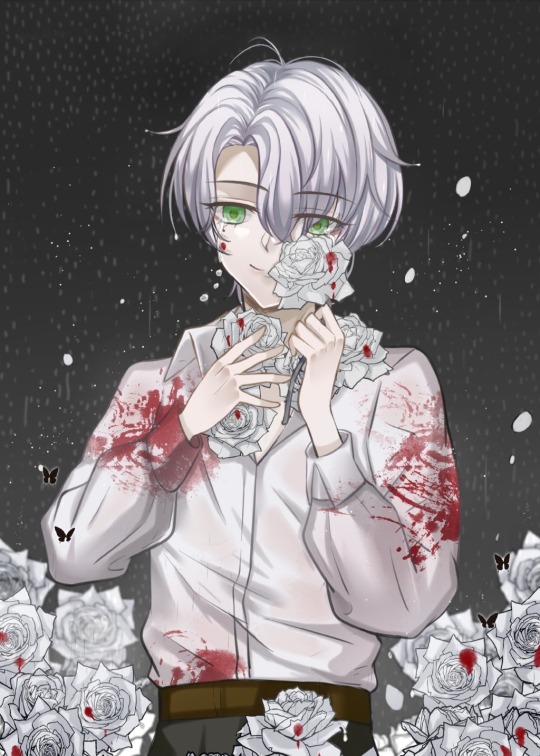
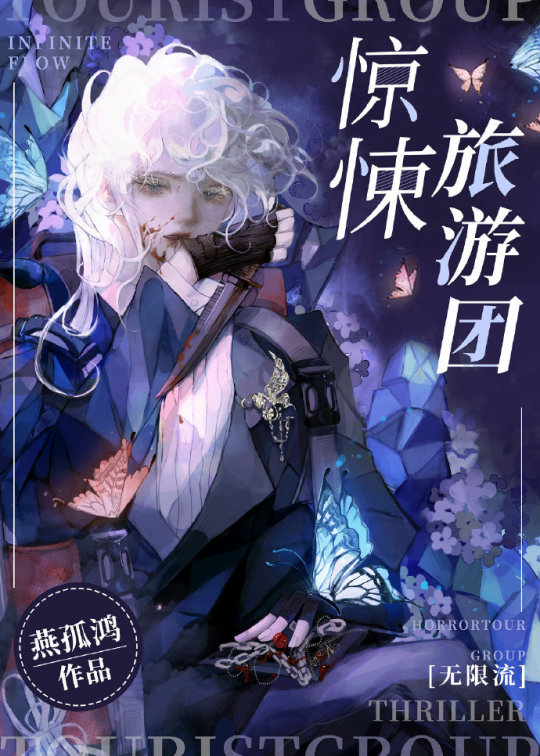
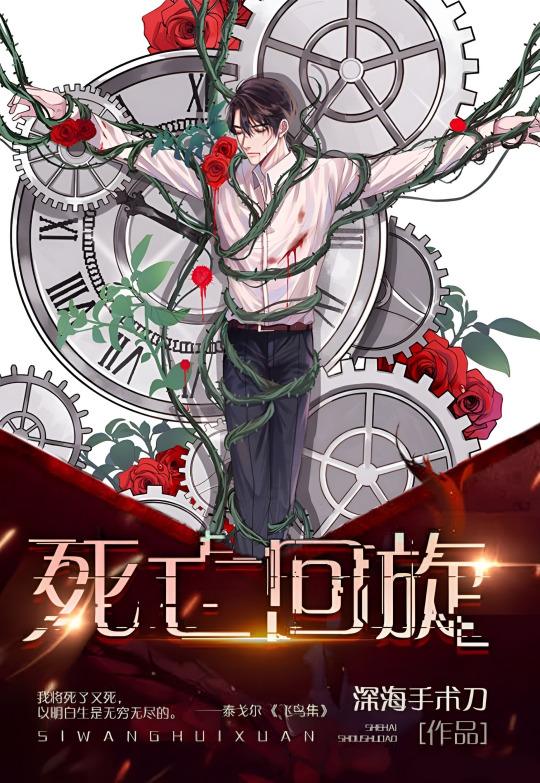
From left to right: Book covers of After the Little Crybaby Enters the Nightmare Cycle, Thriller Tour Group, and Death Spiral

Aaaand there you have it! I was hoping to list 10 elements, but I can only think up to 7 😔
Although I said this post is a rec list of sorts, the quality of the novels I mentioned actually varies. I’m just listing whatever novel would be good as an example (and also what I can remember and have more or less completed, since many of the Unli Flow novels I’m reading are currently on-hold).
#danmei#chinese web novels#the earth is online#i became a god in a horror game#being an extra actor in an escape game#killing god with junk cards#high energy qr code#mist#thriller tour group#web novels#surprise! the supposed talent show was actually-?!#i upended yet another campus urban legend#death spiral#after the little crybaby enters the nightmare cycle#miyamiwu.src#unlimited flow#unli flow#infinite flow#miyamiwu.article#cnovel
89 notes
·
View notes
Text


The buildings of Hinrich and Inken Baller are unique if not eccentric contributions to postwar architecture in Berlin: the architect couple pushed the boundaries of social housing regulations in order to maximize space, light, variability and ultimately living comfort. The Ballers, both part of the 68-generation, were opposed to the contemporary social housing and its boxed uniformity that left no room for development. Consequently, they came up with unusual solutions and integrated communal spaces. Their expressive apartment buildings often seem to have grown towards sun and light, elements that were at the core of the architects’ concept that has been treasured by residents ever since. But professional circles e were less enthusiastic about their unconventional solutions and treated the Ballers as outcasts of the architectural establishment. This notwithstanding they were frequently commissioned to build by empathic and venturous clients.
In 2022 the Deutsches Architektur Centrum in Berlin showed „Visiting. Inken Baller und Hinrich Baller, Berlin 1966-89“, a retrospective exhibition of the Ballers’ impressive work curated by Urban Fragment Observatory. The exhibition was accompanied by an eponymous catalogue that has recently been published in a second edition by Park Books.
In keeping with its title, the editors visited Inken & Hinrich Baller for a long interview as well as residents of their buildings. The result is a lively recollection of the architectural climate of West-Berlin, free spirited architects with strong convictions and generally happy residents. The latter emphasize the unusually high living comfort that results from the flowing sequence of rooms and the large balconies.
Beyond these insights it is especially the complete and detailed work catalogue that makes the book indispensable: it includes explanatory texts, all relevant data on the projects, plans as well as old and current photographs that provide detailed insights into the buildings and the lives going on behind their walls. Hence, „Visiting Hinrich & Inken Baller“ is a pivotal publication on the architects, rich and lively just like their architecture. Warmly recommended!
#inken baller#hinrich baller#monograph#architecture#germany#organic architecture#architecture book#park books#book
11 notes
·
View notes